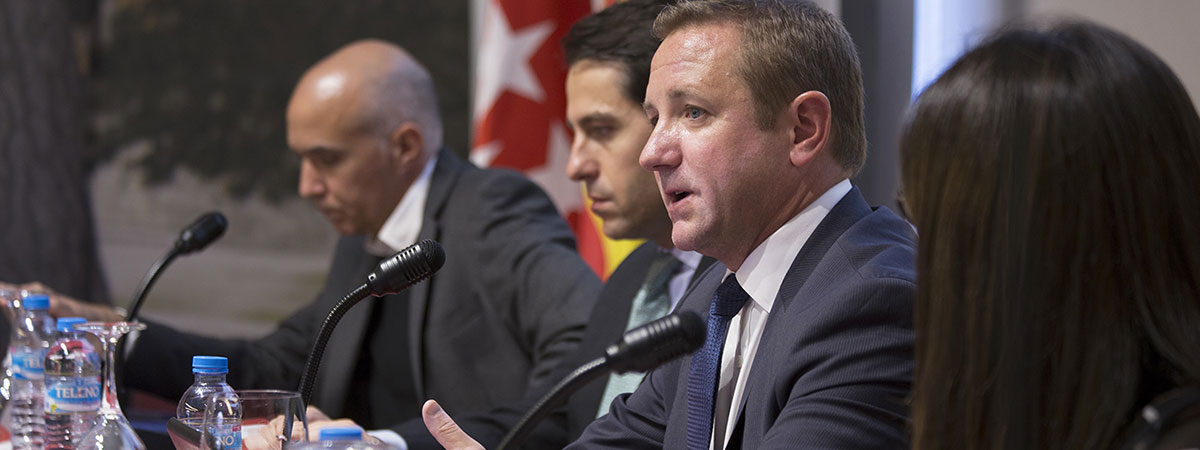Master’s Degree in Intelligence Analysis and Cyberintelligence

Specialize both in the field of Security and Defense as well as in economic and competitive intelligence
The first official Master's Degree in Intelligence in Spain, which also offers its students the possibility of choosing between two specialty itineraries during their education, an intelligence itinerary applied to Security and Defense, and the Economic and Competitive Intelligence itinerary. These are the most demanded specialties in the professional sector.
The proposal of this Master's degree follows the line of action defined in the National Cybersecurity Strategy, which stipulates the need to expand and improve skills for detection and analysis of cyberthreats, so as to allow the identification of attack procedures and origins, as well as the elaboration of the intelligence necessary for a more effective protection, attribution and defense. In short, to enhance cyber defense and cyber intelligence abilities.
The fundamental objective of the Master's Degree in Intelligence Analysis and Cyberintelligence is to provide professional academic training for students interested in advising and participating in the creation of intelligence, through the study, analysis and practice of the different methodologies for obtaining, analyzing and transformation of information into a tangible product.
This Master's degree includes training in intelligence, but also training in the field of cyber intelligence, as it is the field where the vast majority of threats and vulnerabilities are occurring.
VI Edition of the Master’s Degree in Intelligence Analysis and Cyberintelligence
Held by the Nebrija University. It addressed key issues in conflict and intercultural relations.
The Master's Degree in Intelligence and Cyberintelligence Analysis integrates cutting-edge tools into student training, including market leaders such as Maltego, Experian, Shodan, and IntelX. This ensures practical exposure to threat intelligence and cyber intelligence, empowering our graduates to confront global challenges and cyber threats with confidence.




Student profile: All applicants who meet the requirements provided for in current legislation can access the Master's Degree Program in Intelligence Analysis and Cyberintelligence, that is, those who have a bachelor's or undergraduate (or equivalent) degree, who are capable of managing a large amount of information, possess succinct knowledge of the different information classification programs and mechanisms, as well as a correct evaluation thereof, must also be able to issue a report that allows, from an operational point of view, to make decisions. Specifically, candidates must be one of the following:
- Graduate in Law
- Graduate in Security or Criminology
- Graduate in Business Administration
- Graduate in Economics
- Graduate in Cybersecurity
- Graduate in Business Intelligence
Official Degree::Master's Degree Program in Intelligence Analysis and Cyberintelligence
Center responsible:School of Law and International Relations
Places offered::
1st year of implementation:
- Classroom Attendance: 40
- Blended: 40
- Online: 50
Rest of years:
- Classroom Attendance:40
- Blended: 50
- Online: 60
Branch of knowledge: Social and Legal Sciences
Total Credits 60 credits.
Minimum 12 ECTS credits and maximum 60 ECTS credits per enrollment and academic year
Academic year it was implemented: 2020/2021
Duration:: 1 year. From october to june
Type of Teaching: Classroom Attendance / Blended / Online
Normativa Académica: General student’s regulations. Credit transfer and recognition. Regulation of student participation. Common procedures for carrying out the Final Research Project
University Services: [+info]
Internal Quality Assurance System System managers Incidents, Suggestions and Complaints Job placement report and assessment of training received
Become an intelligence analyst with a clearly professional orientation
Curriculum
All our degrees and curricula have been prepared in accordance with the new guidelines set by current legislation, having already been verified by the National Agency for Quality Assessment.
The student must take 60 credits.
Compulsory Subjects 24 ECTS
- 6 ECTS | Intelligence, counterintelligence, security and cybersecurity concepts and procedures
- 6 ECTS | Disciplines for obtaining intelligence
- 6 ECTS | Intelligence analysis techniques
- 6 ECTS | Economic intelligence
Internships and FRP 12 ECTS
- 6 ECTS | Final Research Project for Master’s degree
- 6 ECTS | Professional Internship
Elective Subjects 24 ECTS
ITINERARY 1: Specialty in Intelligence for Security and Defense- 6 ECTS | Intelligence organization and structure
- 6 ECTS | Contribution of intelligence to planning. Method and application
- 6 ECTS | Fundamental concepts of Strategy and Security and Defense
- 6 ECTS | Investigation methodology. Intelligence interest areas. Methodological investigation and introduction
ITINERARY 2: Specialty in Economic and Competitive Intelligence- 6 ECTS | Intelligence units in the company and the legal framework of intelligence
- 6 ECTS | Planning and strategy
- 6 ECTS | Intelligence communication
- 3 ECTS | Cyber intelligence vs. Cybersecurity. Business digitalization processes
- 3 ECTS | Economic counterintelligence
Information of the Subjects
Profesores
| Profesores Professors | Porcentaje de Doctores Percentage of PhD holders |
| 60 | 88% |
Profesores
Professors
 Carlos Galán Cordero
Director del Máster en análisis de Inteligencia y Ciberinteligencia
Director of the Master's Degree in Intelligence Analysis and Cyber Intelligence
Licenciado en Derecho por la Universidad Autónoma de Madrid, Master en Relaciones Internacionales y Comunicación por la Universidad Camilo José Cela y Experto en ciberamenazas y ciberinteligencia por la Universidad Pablo de Olavide.
Carlos Galán Cordero
Director del Máster en análisis de Inteligencia y Ciberinteligencia
Director of the Master's Degree in Intelligence Analysis and Cyber Intelligence
Licenciado en Derecho por la Universidad Autónoma de Madrid, Master en Relaciones Internacionales y Comunicación por la Universidad Camilo José Cela y Experto en ciberamenazas y ciberinteligencia por la Universidad Pablo de Olavide.
Su labor investigadora se desarrolla fundamentalmente en el ámbito del Derecho TIC y Protección de Datos. Es autor de numerosos artículos sobre Nuevas Tecnologías , Inteligencia y Amenazas Híbridas.
Su actividad docente se centra en el ámbito de las Relaciones Internacionales. Habiendo impartido cursos de Postgrado y Másteres Universitarios tanto en Universidades españolas como extranjeras (Universidad Carlos III de Madrid, Universidad Oberta de Cataluña, etc.); también ha realizado estancias internacionales de investigación (Universidad Estatal de Moscú); ha participado en diversos Think Tanks y cursos organizados por el Centro Criptológico Nacional, adscrito al Centro Nacional de Inteligencia; y ha formado parte de equipos de investigación del Parlamento Europeo (STOA) sobre Amenazas Hibridas y Comunicaciones Estratégicas. Asímismo, ha formado parte de la organización del primer congreso sobre desinformación del DefCon.
 Adrián Nicolás Marchal González
Profesor y Director del Departamento de Seguridad y Defensa
Professor and Director of the Department of Security and Defense
Director del Departamento de Seguridad y Defensa de la Universidad Antonio de Nebrija, Director del Máster Universitario en análisis de Inteligencia y Ciberinteligencia de la Universidad Antonio de Nebrija desde 2020, primer máster oficial en la materia en España.
Adrián Nicolás Marchal González
Profesor y Director del Departamento de Seguridad y Defensa
Professor and Director of the Department of Security and Defense
Director del Departamento de Seguridad y Defensa de la Universidad Antonio de Nebrija, Director del Máster Universitario en análisis de Inteligencia y Ciberinteligencia de la Universidad Antonio de Nebrija desde 2020, primer máster oficial en la materia en España.
Doctor por la Universidad de Castilla-La mancha en 2017 con la tesis titulada "El confidente en el proceso penal", calificada con sobresaliente cum laude. Máster Universitario en Ciberseguridad (UNIR), Licenciado en Criminología (UCJC), Máster Universitario en Derechos Fundamentales (UNED), Licenciado en Derecho (UC3M). Asimismo, cuento con diferentes certificaciones como "Cyber Threat Management" de CISCO o "Digital Forensics Essentials" de EC-Council. Revisor de las revistas “Talanta”, “Estudios en Seguridad y Defensa”, “Logos Guardia Civil” y miembro del Comité Editorial de la revista “Perspectivas en Inteligencia”.
Empezó a impartir docencia universitaria en el año 2014, y desde entonces he impartido más de 40 asignaturas en titulaciones oficiales de diferentes Universidades, destacando la docencia en los Grados en Criminología, Grado en Derecho, Grado en Seguridad, Máster Universitario en Criminalística y Máster Universitario en análisis de Inteligencia y Ciberinteligencia.
Abogado en ejercicio desde 2012, colegiado en el Ilustre Colegio de Abogados de Madrid, especializado en Derecho Penal. Perito judicial en el ámbito de la informática forense. Habilitado por el Ministerio de Interior de España como Director de Seguridad y Jefe de Seguridad.
 Iván Portillo Morales
Profesor
Professor
Responsable de Inteligencia y Amenzas en BeDisruptive. Analista de ciberinteligencia especializado en el análisis de amenazas (CTI). Instructor en Curso STIC sobre cibervigilancia del CCN-CERT, director de Master sobre CTI en Kschool, docente sobre técnicas de análisis de Inteligencia en Universidad Nebrija y otras formaciones. Ponente habitual en congresos internacionales de Inteligencia y Ciberseguridad.
Iván Portillo Morales
Profesor
Professor
Responsable de Inteligencia y Amenzas en BeDisruptive. Analista de ciberinteligencia especializado en el análisis de amenazas (CTI). Instructor en Curso STIC sobre cibervigilancia del CCN-CERT, director de Master sobre CTI en Kschool, docente sobre técnicas de análisis de Inteligencia en Universidad Nebrija y otras formaciones. Ponente habitual en congresos internacionales de Inteligencia y Ciberseguridad.
 Ana Isabel Páramo Carretero
Profesora
Professor
Licenciada en Derecho por la Universidad Pontificia Comillas y Letrada Asesora de Empresas por ICADE (E-1). Formación en comercio exterior (CEOE). Experiencia en la tramitación de impagos en la zona OCDE en la Compañía Española de Seguros de Crédito a la Exportación (CESCE). De 1999 hasta 2019, analista de inteligencia y formadora en esta materia en el Ministerio de Defensa español. Durante los últimos diez años de este periodo ha diseñado e impartido actividades formativas para organizaciones vinculadas a la seguridad tanto en España como en el extranjero: Latinoamérica, África y Oriente Medio, sobre todo. Desde marzo de 2019, consultora y formadora en materia de inteligencia, con mayor especialización en la producción y el análisis de inteligencia. Su actividad docente se centra en el ámbito de la seguridad y la inteligencia, tanto pública como privada. Ha impartido docencia en Cursos de Postgrado y Másteres Universitarios en ICADE, Universidad Autónoma de Madrid, Universidad Juan Carlos I en colaboración con la Universidad Carlos III, Universidad Católica de Murcia, INIR, Universidad Francisco de Vitoria, entre otras. Asimismo, también participa en diversos foros relacionados con la seguridad, la estrategia, la planificación y la inteligencia. Ha recibido la Cruz al Mérito Militar y la Cruz al Mérito Naval, ambas con distintivo blanco, por su trayectoria profesional en el Ministerio de Defensa de España.
Ana Isabel Páramo Carretero
Profesora
Professor
Licenciada en Derecho por la Universidad Pontificia Comillas y Letrada Asesora de Empresas por ICADE (E-1). Formación en comercio exterior (CEOE). Experiencia en la tramitación de impagos en la zona OCDE en la Compañía Española de Seguros de Crédito a la Exportación (CESCE). De 1999 hasta 2019, analista de inteligencia y formadora en esta materia en el Ministerio de Defensa español. Durante los últimos diez años de este periodo ha diseñado e impartido actividades formativas para organizaciones vinculadas a la seguridad tanto en España como en el extranjero: Latinoamérica, África y Oriente Medio, sobre todo. Desde marzo de 2019, consultora y formadora en materia de inteligencia, con mayor especialización en la producción y el análisis de inteligencia. Su actividad docente se centra en el ámbito de la seguridad y la inteligencia, tanto pública como privada. Ha impartido docencia en Cursos de Postgrado y Másteres Universitarios en ICADE, Universidad Autónoma de Madrid, Universidad Juan Carlos I en colaboración con la Universidad Carlos III, Universidad Católica de Murcia, INIR, Universidad Francisco de Vitoria, entre otras. Asimismo, también participa en diversos foros relacionados con la seguridad, la estrategia, la planificación y la inteligencia. Ha recibido la Cruz al Mérito Militar y la Cruz al Mérito Naval, ambas con distintivo blanco, por su trayectoria profesional en el Ministerio de Defensa de España.
 Álvaro Cremades Guisado
Profesor
Professor
Licenciado en Ciencias Políticas y de la Administración por la Universidad Complutense de Madrid; Máster en Análisis de Inteligencia por la Universidad Rey Juan Carlos y Universidad Carlos III de Madrid; estudiante de doctorado en Ciencia Política y de la Administración y Relaciones Internacionales por la Universidad Complutense de Madrid.
Álvaro Cremades Guisado
Profesor
Professor
Licenciado en Ciencias Políticas y de la Administración por la Universidad Complutense de Madrid; Máster en Análisis de Inteligencia por la Universidad Rey Juan Carlos y Universidad Carlos III de Madrid; estudiante de doctorado en Ciencia Política y de la Administración y Relaciones Internacionales por la Universidad Complutense de Madrid.
Su actividad docente se centra en el ámbito de la seguridad y el análisis de inteligencia, con experiencia en Cursos de Postgrado y Másteres Universitarios en la Universidad Nebrija, además de haber participado como profesor invitado en diferentes universidades latinoamericanas sobre dichas materias.
Su labor de investigación se desarrolla, con especial énfasis en los procesos de transformación de las instituciones estatales dedicadas a la producción de inteligencia, habiendo sido investigador visitante en la Escuela Superior de Guerra “General Rafael Reyes Prieto” de las Fuerzas Militares de Colombia. Es miembro del Comité Editorial de la Revista Estudios en Seguridad y Defensa (Escuela Superior de Guerra General “Rafael Reyes Prieto”, Colombia) Revista Internacional de Estudios sobre terrorismo (Observatorio Internacional de Estudios sobre Terrorismo, España). Es, además, promotor de diferentes proyectos dirigidos a la divulgación sobre materias asociadas a la inteligencia
 Emilia José Peña Ruiz
Profesora
Professor
Doctor en Derecho por la Universidad Rey Juan Carlos. Máster en Analista de Inteligencia por la misma universidad. Licenciado en Filosofía y Letras por la Universidad Autónoma de Madrid. Oficial de la Armada Española, especialista en Inteligencia. Ha impartido docencia en diversos Cursos de Postgrado y Másteres Universitarios en la Universidad Rey Juan Carlos así como en la IMF Business School.
Emilia José Peña Ruiz
Profesora
Professor
Doctor en Derecho por la Universidad Rey Juan Carlos. Máster en Analista de Inteligencia por la misma universidad. Licenciado en Filosofía y Letras por la Universidad Autónoma de Madrid. Oficial de la Armada Española, especialista en Inteligencia. Ha impartido docencia en diversos Cursos de Postgrado y Másteres Universitarios en la Universidad Rey Juan Carlos así como en la IMF Business School.
 Alfonso López de la Osa Escribano
Profesor
Professor
Alfonso López de la Osa Escribano, titular de la Cátedra de Seguridad y Defensa Jean Monnet EUDEFENCE de la Universidad Nebrija, ha cursado el Curso de Defensa Nacional en el CESEDEN, es licenciado en Derecho por la Universidad Complutense de Madrid, Master en Derecho Comunitario por la Universidad Complutense de Madrid, DEA (Diplôme d’Etudes Approfondies) en Derecho público comparado de los Estados Europeos (Droit public comparé des Etats Européens) y Doctor en Derecho público, ambos por la Universidad de Paris I Panteón-Sorbona (Mention très honorable avec les félicitations du Jury - Magna cum laude) por unanimidad. Ha sido profesor de la Universidad Complutense de Madrid, de la Universidad de Pau et de Pays de l’Adour en Francia, y de la Universidad de Houston, así como director del Centro de Estudio Jurídicos Comparados México Estados Unidos (Center for U.S. and Mexican Law), de esta última Universidad. En la Universidad de Houston, dedicó su investigación a la seguridad migratorias, contrabando y trata de personas, así como a la gestión de crisis en contextos de urgencia (Emergency Law) y protección del orden público. Actualmente es Decano y profesor Derecho Administrativo de la Facultad de Derecho y de Relaciones Internacionales de la Universidad Nebrija (desde marzo de 2022). Ha impartido docencia en distintas universidades francesas, mexicanas, españolas y estadounidenses, entre otras, así como participado en numerosos congresos y seminarios. Es autor de varias publicaciones en España, Francia y Estados Unidos.
Alfonso López de la Osa Escribano
Profesor
Professor
Alfonso López de la Osa Escribano, titular de la Cátedra de Seguridad y Defensa Jean Monnet EUDEFENCE de la Universidad Nebrija, ha cursado el Curso de Defensa Nacional en el CESEDEN, es licenciado en Derecho por la Universidad Complutense de Madrid, Master en Derecho Comunitario por la Universidad Complutense de Madrid, DEA (Diplôme d’Etudes Approfondies) en Derecho público comparado de los Estados Europeos (Droit public comparé des Etats Européens) y Doctor en Derecho público, ambos por la Universidad de Paris I Panteón-Sorbona (Mention très honorable avec les félicitations du Jury - Magna cum laude) por unanimidad. Ha sido profesor de la Universidad Complutense de Madrid, de la Universidad de Pau et de Pays de l’Adour en Francia, y de la Universidad de Houston, así como director del Centro de Estudio Jurídicos Comparados México Estados Unidos (Center for U.S. and Mexican Law), de esta última Universidad. En la Universidad de Houston, dedicó su investigación a la seguridad migratorias, contrabando y trata de personas, así como a la gestión de crisis en contextos de urgencia (Emergency Law) y protección del orden público. Actualmente es Decano y profesor Derecho Administrativo de la Facultad de Derecho y de Relaciones Internacionales de la Universidad Nebrija (desde marzo de 2022). Ha impartido docencia en distintas universidades francesas, mexicanas, españolas y estadounidenses, entre otras, así como participado en numerosos congresos y seminarios. Es autor de varias publicaciones en España, Francia y Estados Unidos.
 Fernando Fortún Ripolles
Profesor
Professor
Fernando Fortún es un profesional con una destacada trayectoria en el ámbito de la seguridad y la defensa, respaldada por una sólida formación académica y experiencia internacional. Su carrera comenzó con un grado en Oficiales del Ejército (Infantería) obtenido entre 2008 y 2013, y se ha complementado con varios másteres, incluyendo uno en Seguridad y Defensa (2017-2018) y otro en Estudios Estratégicos y Seguridad Internacional (2019-2020). Actualmente, está cursando un máster en Seguridad y Protección.Fortún ha ocupado roles significativos en diversas organizaciones, como su actual posición desde 2023 como Gerente de Seguridad Corporativa en Repsol, donde supervisa la inteligencia y los proyectos de seguridad a nivel corporativo. Además, ha sido asesor del Estado Mayor de Defensa para el Ministro de Defensa de España, analizando inteligencia en áreas de conflicto y desarrollando planes de seguridad. Su experiencia internacional incluye su trabajo como Aide de Camp para las Naciones Unidas en Líbano (2022-2023), donde coordinó la seguridad para el Jefe de Misión. Anteriormente, lideró equipos de protección cercana en áreas de alto riesgo con la OTAN en Irak (2017-2018) y desempeñó funciones ejecutivas en el Ejército Español, donde supervisó operaciones militares complejas. Fortún es fluido en español, inglés y francés, lo que le permite operar eficazmente en contextos internacionales.
Fernando Fortún Ripolles
Profesor
Professor
Fernando Fortún es un profesional con una destacada trayectoria en el ámbito de la seguridad y la defensa, respaldada por una sólida formación académica y experiencia internacional. Su carrera comenzó con un grado en Oficiales del Ejército (Infantería) obtenido entre 2008 y 2013, y se ha complementado con varios másteres, incluyendo uno en Seguridad y Defensa (2017-2018) y otro en Estudios Estratégicos y Seguridad Internacional (2019-2020). Actualmente, está cursando un máster en Seguridad y Protección.Fortún ha ocupado roles significativos en diversas organizaciones, como su actual posición desde 2023 como Gerente de Seguridad Corporativa en Repsol, donde supervisa la inteligencia y los proyectos de seguridad a nivel corporativo. Además, ha sido asesor del Estado Mayor de Defensa para el Ministro de Defensa de España, analizando inteligencia en áreas de conflicto y desarrollando planes de seguridad. Su experiencia internacional incluye su trabajo como Aide de Camp para las Naciones Unidas en Líbano (2022-2023), donde coordinó la seguridad para el Jefe de Misión. Anteriormente, lideró equipos de protección cercana en áreas de alto riesgo con la OTAN en Irak (2017-2018) y desempeñó funciones ejecutivas en el Ejército Español, donde supervisó operaciones militares complejas. Fortún es fluido en español, inglés y francés, lo que le permite operar eficazmente en contextos internacionales.
 Moises Alonso Baratas
Profesor
Professor
Moisés Alonso es un destacado sociólogo con una sólida formación académica y una amplia experiencia profesional en investigación social y gestión corporativa. Doctor "cum laude" en Sociología por la Universidad Complutense de Madrid, su tesis se centró en el análisis del "prosumidor" como figura emblemática de las nuevas formas de organización social en un contexto neoliberal. Además, cuenta con un posgrado en Investigación Social Aplicada y Análisis de Datos y un máster en Neuromanagement, lo que le ha permitido desarrollar una perspectiva interdisciplinaria que integra la sociología, la neurociencia y las tecnologías de la información.
A lo largo de su carrera, Moisés ha trabajado como técnico de proyectos de investigación social freelance, diseñando y desarrollando proyectos para diversos organismos y particulares. Ha colaborado en estudios sobre racismo e inmigración en España y ha participado como docente en cursos online sobre neurociencias aplicadas a la política. Su experiencia también abarca el ámbito del periodismo, habiendo trabajado como periodista freelance para varios medios, donde desarrolló estrategias de contenido y redes sociales. Moisés es un profesional versátil con habilidades avanzadas en análisis de datos, comunicación y gestión de proyectos, lo que lo convierte en un candidato ideal para impartir clases en programas relacionados con la inteligencia y la transformación social.
Moises Alonso Baratas
Profesor
Professor
Moisés Alonso es un destacado sociólogo con una sólida formación académica y una amplia experiencia profesional en investigación social y gestión corporativa. Doctor "cum laude" en Sociología por la Universidad Complutense de Madrid, su tesis se centró en el análisis del "prosumidor" como figura emblemática de las nuevas formas de organización social en un contexto neoliberal. Además, cuenta con un posgrado en Investigación Social Aplicada y Análisis de Datos y un máster en Neuromanagement, lo que le ha permitido desarrollar una perspectiva interdisciplinaria que integra la sociología, la neurociencia y las tecnologías de la información.
A lo largo de su carrera, Moisés ha trabajado como técnico de proyectos de investigación social freelance, diseñando y desarrollando proyectos para diversos organismos y particulares. Ha colaborado en estudios sobre racismo e inmigración en España y ha participado como docente en cursos online sobre neurociencias aplicadas a la política. Su experiencia también abarca el ámbito del periodismo, habiendo trabajado como periodista freelance para varios medios, donde desarrolló estrategias de contenido y redes sociales. Moisés es un profesional versátil con habilidades avanzadas en análisis de datos, comunicación y gestión de proyectos, lo que lo convierte en un candidato ideal para impartir clases en programas relacionados con la inteligencia y la transformación social.
 Martín Artola Korta
Profesor
Professor
Martin Artola Korta es un académico español originario de Beasain, España, que actualmente reside en Tbilisi, Georgia. Se desempeña como profesor asociado en la Universidad Nebrija desde 2023 y como profesor extranjero en la Universidad Estatal Ivane Javakhishvili de Tbilisi desde 2021. Su trayectoria académica incluye un doctorado y un máster en Historia Contemporánea por la Universidad Complutense de Madrid, además de una licenciatura en Historia por la Universidad del País Vasco. Durante su formación, participó en programas de intercambio estudiantil, destacándose su estancia en la Universidad de Finlandia Oriental.
Artola ha recibido varias becas del Gobierno Vasco para investigación predoctoral y estancias de investigación en el extranjero. Ha sido miembro de proyectos de investigación sobre el franquismo y las dictaduras del siglo XX, realizando estancias de investigación en el Centro de Investigación Karelia de la Academia Rusa de Ciencias. Sus publicaciones incluyen artículos revisados por pares sobre historiografía rusa y ucraniana, así como sobre el terror estalinista. También ha presentado ponencias en congresos internacionales sobre literatura vasca y georgiana, estalinismo y diplomacia soviética. Es fluido en euskera, español, inglés y ruso, lo que le permite abordar temas complejos desde una perspectiva multilingüe y multicultural.
Martín Artola Korta
Profesor
Professor
Martin Artola Korta es un académico español originario de Beasain, España, que actualmente reside en Tbilisi, Georgia. Se desempeña como profesor asociado en la Universidad Nebrija desde 2023 y como profesor extranjero en la Universidad Estatal Ivane Javakhishvili de Tbilisi desde 2021. Su trayectoria académica incluye un doctorado y un máster en Historia Contemporánea por la Universidad Complutense de Madrid, además de una licenciatura en Historia por la Universidad del País Vasco. Durante su formación, participó en programas de intercambio estudiantil, destacándose su estancia en la Universidad de Finlandia Oriental.
Artola ha recibido varias becas del Gobierno Vasco para investigación predoctoral y estancias de investigación en el extranjero. Ha sido miembro de proyectos de investigación sobre el franquismo y las dictaduras del siglo XX, realizando estancias de investigación en el Centro de Investigación Karelia de la Academia Rusa de Ciencias. Sus publicaciones incluyen artículos revisados por pares sobre historiografía rusa y ucraniana, así como sobre el terror estalinista. También ha presentado ponencias en congresos internacionales sobre literatura vasca y georgiana, estalinismo y diplomacia soviética. Es fluido en euskera, español, inglés y ruso, lo que le permite abordar temas complejos desde una perspectiva multilingüe y multicultural.
 Gracia Abad Quintanal
Profesora
Professor
Doctora en Ciencias Políticas y Licenciada en Ciencias Políticas y de la Administración por la Universidad Complutense de Madrid. Es experta en Relaciones Internacionales y Política Exterior. Su labor investigadora se centra en la seguridad internacional, las organizaciones internacionales, los procesos de integración y el multilateralismo, las relaciones internacionales de Asia Oriental y la política exterior y de seguridad china. Ha sido investigadora visitante en Royal Holloway, Universidad de Londres, la Universidad de Coimbra, el European Policy Center de Bruselas y la Rajaratnam School of International Studies de Singapur. Su actividad docente está centrada en las Relaciones Internacionales y la Ciencia Política. Ha impartido docencia en Cursos de Grado y Postgrado en la Universidad Complutense de Madrid, Universidad de Salamanca, Universidad Camilo José Cela, Universidad Pontificia Comillas Saint Louis University y San Pablo CEU. Conferenciante en numerosas universidades, entre las que cabe mencionar, Syracuse University, Richmond University, Universidad Pontificia Comillas, Universidad de Valladolid, Universidad Complutense o Royal Holloway.
Gracia Abad Quintanal
Profesora
Professor
Doctora en Ciencias Políticas y Licenciada en Ciencias Políticas y de la Administración por la Universidad Complutense de Madrid. Es experta en Relaciones Internacionales y Política Exterior. Su labor investigadora se centra en la seguridad internacional, las organizaciones internacionales, los procesos de integración y el multilateralismo, las relaciones internacionales de Asia Oriental y la política exterior y de seguridad china. Ha sido investigadora visitante en Royal Holloway, Universidad de Londres, la Universidad de Coimbra, el European Policy Center de Bruselas y la Rajaratnam School of International Studies de Singapur. Su actividad docente está centrada en las Relaciones Internacionales y la Ciencia Política. Ha impartido docencia en Cursos de Grado y Postgrado en la Universidad Complutense de Madrid, Universidad de Salamanca, Universidad Camilo José Cela, Universidad Pontificia Comillas Saint Louis University y San Pablo CEU. Conferenciante en numerosas universidades, entre las que cabe mencionar, Syracuse University, Richmond University, Universidad Pontificia Comillas, Universidad de Valladolid, Universidad Complutense o Royal Holloway.
 Nadia Ahmadouche
Profesora
Professor
Doctora en Organización y administración de empresas por la Universidad Politécnica de Valencia. Acumula más de 10 años de experiencia como docente universitaria en el ámbito de la administración de empresas y además ha sido miembro del equipo de investigación INGENIO (CSIC -UPV) entre 2016 y 2020.
Nadia Ahmadouche
Profesora
Professor
Doctora en Organización y administración de empresas por la Universidad Politécnica de Valencia. Acumula más de 10 años de experiencia como docente universitaria en el ámbito de la administración de empresas y además ha sido miembro del equipo de investigación INGENIO (CSIC -UPV) entre 2016 y 2020.
 Adela Alija Garabito
Profesora
Professor
Doctora en Historia por la Universidad Complutense de Madrid. Licenciada en Geografía e Historia. Acreditada por ACAP. Especialista en Historia contemporánea e Historia de las Relaciones Internacionales. Sus líneas de investigación principales son: La política exterior de España en el siglo XX, Historia de las relaciones internacionales en el siglo XX, las relaciones entre España y América Latina y la Historia de la integración europea. Miembro de la Comisión Española de Historia de las Relaciones Internacionales (CEHRI) y de la Asociación de Historia Contemporánea (AHC). Forma parte del Grupo Interuniversitario de Historia de las Relaciones Internacionales (GHistRI) y es Investigadora principal del Grupo Nebrija de Relaciones Internacionales, Cooperación e Integración en Áreas Regionales (RICINTAR).
Adela Alija Garabito
Profesora
Professor
Doctora en Historia por la Universidad Complutense de Madrid. Licenciada en Geografía e Historia. Acreditada por ACAP. Especialista en Historia contemporánea e Historia de las Relaciones Internacionales. Sus líneas de investigación principales son: La política exterior de España en el siglo XX, Historia de las relaciones internacionales en el siglo XX, las relaciones entre España y América Latina y la Historia de la integración europea. Miembro de la Comisión Española de Historia de las Relaciones Internacionales (CEHRI) y de la Asociación de Historia Contemporánea (AHC). Forma parte del Grupo Interuniversitario de Historia de las Relaciones Internacionales (GHistRI) y es Investigadora principal del Grupo Nebrija de Relaciones Internacionales, Cooperación e Integración en Áreas Regionales (RICINTAR).
 Ivana Laura Ambrosio Racic
Profesora
Professor
Doctora en Ciencias Empresariales por la Universidad Nebrija. Máster Universitario en Creación y Dirección de Empresas por la Universidad Nebrija. Licenciada en Ciencias Económicas y Empresariales por la Universidad Complutense de Madrid, rama de Economía de la Empresa, especialidad en Contabilidad y Auditoría. También Diplomada por la Universidad Complutense de Madrid en Ciencias Empresariales, especialidad en Contabilidad. Cursos de Doctorado en la UCM en el programa de Contabilidad y Auditoría. Profesora del área de Contabilidad de la Universidad Antonio de Nebrija. Ha sido profesora asociada en IE University y en la Universidad Carlos III de Madrid. También profesora y colaboradora en la CECO-ICEX, Nebrija Business School, Fundación COSO, AEDE Business School.
Ivana Laura Ambrosio Racic
Profesora
Professor
Doctora en Ciencias Empresariales por la Universidad Nebrija. Máster Universitario en Creación y Dirección de Empresas por la Universidad Nebrija. Licenciada en Ciencias Económicas y Empresariales por la Universidad Complutense de Madrid, rama de Economía de la Empresa, especialidad en Contabilidad y Auditoría. También Diplomada por la Universidad Complutense de Madrid en Ciencias Empresariales, especialidad en Contabilidad. Cursos de Doctorado en la UCM en el programa de Contabilidad y Auditoría. Profesora del área de Contabilidad de la Universidad Antonio de Nebrija. Ha sido profesora asociada en IE University y en la Universidad Carlos III de Madrid. También profesora y colaboradora en la CECO-ICEX, Nebrija Business School, Fundación COSO, AEDE Business School.
 Andrés Jerónimo Arenas Falótico
Profesor
Professor
Teniente Coronel (retirado), con 7 años de experiencia en el ámbito de la Inteligencia Militar. Abogado, Periodista, Máster en Administración de Empresas, Máster en Educación y Doctor en Management en los Estados Unidos. Profesor Acreditado ANECA. Ha sido premiado por su desempeño profesional y académico tanto nacional como internacionalmente, resalta “El Día de Andrés Arenas” que le otorgó la Alcaldía de Miami en Florida. Tiene más de 13 años en múltiples cargos académicos en universidades dentro y fuera de España. Cuenta con amplia experiencia gerencial de alto nivel en empresas multinacionales cómo CEMEX, BellSouth, Mack Trucks, entre otras. Sus líneas de investigación son relacionadas con el área de negocios internacionales y el área de emprendimiento empresarial satelital pues forma parte de un panel de expertos de Universidad de Tokio en Japón llamado “Mission Idea Contest”.
Andrés Jerónimo Arenas Falótico
Profesor
Professor
Teniente Coronel (retirado), con 7 años de experiencia en el ámbito de la Inteligencia Militar. Abogado, Periodista, Máster en Administración de Empresas, Máster en Educación y Doctor en Management en los Estados Unidos. Profesor Acreditado ANECA. Ha sido premiado por su desempeño profesional y académico tanto nacional como internacionalmente, resalta “El Día de Andrés Arenas” que le otorgó la Alcaldía de Miami en Florida. Tiene más de 13 años en múltiples cargos académicos en universidades dentro y fuera de España. Cuenta con amplia experiencia gerencial de alto nivel en empresas multinacionales cómo CEMEX, BellSouth, Mack Trucks, entre otras. Sus líneas de investigación son relacionadas con el área de negocios internacionales y el área de emprendimiento empresarial satelital pues forma parte de un panel de expertos de Universidad de Tokio en Japón llamado “Mission Idea Contest”.
 Mónica Assama Rafi
Profesora
Professor
Licenciada en Derecho por la Universidad de Barcelona. Profesora de Derecho Mercantil y de Derecho Marítimo de la Universidad Rovira y Virgili de Tarragona desde 1997. Larga trayectoria profesional como abogada especialista en derecho mercantil, derecho marítimo y derecho aéreo, habiendo trabajado en despachos de reconocido prestigio de Barcelona y Madrid. Actualmente es Profesora de Derecho Mercantil. Coordinadora de Calidad y Reconocimientos de la Facultad de Derecho y Relaciones Internacionales. Directora del Grado de Derecho Semipresencial. Coordinadora del Máster de Derecho Empresarial Internacional y del Máster de Derecho Laboral de la Universidad Nebrija.
Mónica Assama Rafi
Profesora
Professor
Licenciada en Derecho por la Universidad de Barcelona. Profesora de Derecho Mercantil y de Derecho Marítimo de la Universidad Rovira y Virgili de Tarragona desde 1997. Larga trayectoria profesional como abogada especialista en derecho mercantil, derecho marítimo y derecho aéreo, habiendo trabajado en despachos de reconocido prestigio de Barcelona y Madrid. Actualmente es Profesora de Derecho Mercantil. Coordinadora de Calidad y Reconocimientos de la Facultad de Derecho y Relaciones Internacionales. Directora del Grado de Derecho Semipresencial. Coordinadora del Máster de Derecho Empresarial Internacional y del Máster de Derecho Laboral de la Universidad Nebrija.
 Jessica Bayón Pérez
Profesora
Professor
Doctora en Ciencias Sociales con especialidad en Recursos Humanos. Profesora Acreditada ANECA. Galardonada con la Medalla de Oro al Mérito del Trabajo por la Asociación Europea de Economía y Competitividad. Trayectoria profesional enfocada en Recursos Humanos. Mejor expediente académico del Grado en Relaciones Laborales y Recursos Humanos con mención en asesoría de empresa. Ello, le faculta a postular el premio a nivel nacional de trayectoria académica por el Ministerio de Educación, Cultura y Deporte. Autora de contenidos en el área de empresa: Dirección estratégica de Empresa, Cultura Empresarial y Dirección y Gestión de aeropuertos. Trayectoria en diferentes Universidades en el ámbito Jurídico y Recursos Humanos. Ponente de Conferencias Internacionales, entrevistada en Onda Zero. Estancia postdoctoral en la Universidad de Hamk (Finlandia) y en la Universidad del Istmo (Panamá). Directora de Tesis: La Gestión Estratégica del Talento Humano como Potencial para la Ventaja Competitiva en las Organizaciones Marítimas y Aeroportuarias de Panamá. Universidad del Istmo. Publicaciones en la línea de investigación cómo la inteligencia artificial, robótica y las nuevas tecnologías están afectando a las relaciones laborales y a los derechos fundamentales.
Jessica Bayón Pérez
Profesora
Professor
Doctora en Ciencias Sociales con especialidad en Recursos Humanos. Profesora Acreditada ANECA. Galardonada con la Medalla de Oro al Mérito del Trabajo por la Asociación Europea de Economía y Competitividad. Trayectoria profesional enfocada en Recursos Humanos. Mejor expediente académico del Grado en Relaciones Laborales y Recursos Humanos con mención en asesoría de empresa. Ello, le faculta a postular el premio a nivel nacional de trayectoria académica por el Ministerio de Educación, Cultura y Deporte. Autora de contenidos en el área de empresa: Dirección estratégica de Empresa, Cultura Empresarial y Dirección y Gestión de aeropuertos. Trayectoria en diferentes Universidades en el ámbito Jurídico y Recursos Humanos. Ponente de Conferencias Internacionales, entrevistada en Onda Zero. Estancia postdoctoral en la Universidad de Hamk (Finlandia) y en la Universidad del Istmo (Panamá). Directora de Tesis: La Gestión Estratégica del Talento Humano como Potencial para la Ventaja Competitiva en las Organizaciones Marítimas y Aeroportuarias de Panamá. Universidad del Istmo. Publicaciones en la línea de investigación cómo la inteligencia artificial, robótica y las nuevas tecnologías están afectando a las relaciones laborales y a los derechos fundamentales.
 Gema Alejandra Botana García
Profesora
Professor
Doctora en Derecho internacional por la Universidad de Notre Dame, Estados Unidos (con una beca Fulbright). Por la misma Universidad Notre Dame, Máster en Derecho internacional Humanitario. Licenciada en Derecho por la Universidad de Haifa, Israel. Ha trabajado en la Asociación para los Derechos civiles en Israel y en la organización de Derechos humanos REDRESS, en Londres, Reino Unido, entre otras organizaciones. Ha publicado como autora y coautora diversas obras sobre su línea de investigación: el régimen internacional de los derechos humanos y el derecho humanitario en general. Ha sido profesora en la Universidad de Haifa, Israel.
Gema Alejandra Botana García
Profesora
Professor
Doctora en Derecho internacional por la Universidad de Notre Dame, Estados Unidos (con una beca Fulbright). Por la misma Universidad Notre Dame, Máster en Derecho internacional Humanitario. Licenciada en Derecho por la Universidad de Haifa, Israel. Ha trabajado en la Asociación para los Derechos civiles en Israel y en la organización de Derechos humanos REDRESS, en Londres, Reino Unido, entre otras organizaciones. Ha publicado como autora y coautora diversas obras sobre su línea de investigación: el régimen internacional de los derechos humanos y el derecho humanitario en general. Ha sido profesora en la Universidad de Haifa, Israel.
 Sonia Boulos
Profesora
Professor
Doctora en Derecho internacional por la Universidad de Notre Dame, Estados Unidos (con una beca Fulbright). Por la misma Universidad Notre Dame, Máster en Derecho internacional Humanitario. Licenciada en Derecho por la Universidad de Haifa, Israel. Ha trabajado en la Asociación para los Derechos civiles en Israel y en la organización de Derechos humanos REDRESS, en Londres, Reino Unido, entre otras organizaciones. Ha publicado como autora y coautora diversas obras sobre su línea de investigación: el régimen internacional de los derechos humanos y el derecho humanitario en general. Ha sido profesora en la Universidad de Haifa, Israel.
Sonia Boulos
Profesora
Professor
Doctora en Derecho internacional por la Universidad de Notre Dame, Estados Unidos (con una beca Fulbright). Por la misma Universidad Notre Dame, Máster en Derecho internacional Humanitario. Licenciada en Derecho por la Universidad de Haifa, Israel. Ha trabajado en la Asociación para los Derechos civiles en Israel y en la organización de Derechos humanos REDRESS, en Londres, Reino Unido, entre otras organizaciones. Ha publicado como autora y coautora diversas obras sobre su línea de investigación: el régimen internacional de los derechos humanos y el derecho humanitario en general. Ha sido profesora en la Universidad de Haifa, Israel.
 Santiago Budria Rodríguez
Profesor
Professor
Licenciado en economía por la Universidad Pompeu Fabra, y Doctor en Economía por la Universidad de Alicante. Con más de 1000 citaciones en Google Scholar y más de 20 artículos en revistas JCR, ha colaborado en una docena de proyectos de investigación competitivos y consultoría. Sus áreas de interés son la inteligencia económica, microeconometría, el mercado de trabajo, la economía de la educación, la desigualdad y el bienestar.
Santiago Budria Rodríguez
Profesor
Professor
Licenciado en economía por la Universidad Pompeu Fabra, y Doctor en Economía por la Universidad de Alicante. Con más de 1000 citaciones en Google Scholar y más de 20 artículos en revistas JCR, ha colaborado en una docena de proyectos de investigación competitivos y consultoría. Sus áreas de interés son la inteligencia económica, microeconometría, el mercado de trabajo, la economía de la educación, la desigualdad y el bienestar.
 Bernardino Cortijo Fernández
Profesor
Professor
Estudió Ciencias Matemáticas, licenciándose con las Especialidades de Investigación Operativa y Estadística (UNED), asimismo realizó el Grado en Derecho (Nebrija), Licenciatura en Ciencias Policiales (Salamanca-ESP) e Ingeniería de Caminos, Canales y Puertos (UPM- LAX). Tiene un postgrado en Telecomunicaciones (UPM), en Derecho Internacional e Internet (Santiago de Compostela) y en Delitos Tecnológicos (UEM). Diplomado en Inteligencia Artificial y Sistemas Expertos (INAP) y Analista Superior de Sistemas (INAP) y en Internet (LAX). Acreditado en Londres como LA/BS7799. Miembro acreditado de la Asociación Europea de Peritaje Forense.
Bernardino Cortijo Fernández
Profesor
Professor
Estudió Ciencias Matemáticas, licenciándose con las Especialidades de Investigación Operativa y Estadística (UNED), asimismo realizó el Grado en Derecho (Nebrija), Licenciatura en Ciencias Policiales (Salamanca-ESP) e Ingeniería de Caminos, Canales y Puertos (UPM- LAX). Tiene un postgrado en Telecomunicaciones (UPM), en Derecho Internacional e Internet (Santiago de Compostela) y en Delitos Tecnológicos (UEM). Diplomado en Inteligencia Artificial y Sistemas Expertos (INAP) y Analista Superior de Sistemas (INAP) y en Internet (LAX). Acreditado en Londres como LA/BS7799. Miembro acreditado de la Asociación Europea de Peritaje Forense.
Es miembro de la Escala Superior del Cuerpo Nacional de Policía (fundador de la Unidad de Delincuencia Tecnológica; responsable operativo en la Brigada de Delincuencia Económica y Financiera; Director de Proyectos Informáticos) y ha sido Vicepresidente y Directivo de empresas y filiales en Terra, Lycos, Endemol, Telefónica Corporación, Telefónica Europa y Telefónica España (responsabilidades de Seguridad, Gestión y Fraudes), y Presidente del Grupo de Comercio Electrónico para Europa y África. Actualmente es Vicepresidente de la Asociación de Directores de Seguridad y CEO y Consejero de empresas del sector de las Comunicaciones, Ciberseguridad y Ciberinteligencia.
Profesor del Master de Inteligencia de la URJC, Máster de Criminalidad de la UCA, profesor del Curso Superior de Gestión y Dirección de Seguridad en Universidades españolas (USAL) y Director del Máster de Ciberdelincuencia de la Universidad de Nebrija. Autor de libros y artículos relacionados con la Seguridad, el Derecho de la Nuevas Tecnologías, el Ciberterrorismo y la Dirección y Gestión de la Seguridad Privada.
 Alfredo Crespo Alcázar
Profesor
Professor
Doctor por la Universidad Rey Juan Carlos de Madrid, Máster oficial en Análisis y Prevención del Terrorismo por la Universidad Rey Juan Carlos de Madrid y Diploma de Especialización en Análisis del Terrorismo Yihadista, Insurgencias y Movimientos Radicales (Universidad Pablo Olavide de Sevilla). Es, así mismo, Licenciado en Ciencias Políticas (UNED), en Ciencias de la Información (UCM). Actualmente ejerce como profesor del Máster Universitario en Relaciones Internacionales y en el Máster en Gestión de Riesgos en Conflictos en la Universidad Antonio de Nebrija de Madrid. Cuenta con más de una veintena de publicaciones en revistas científicas. Ha participado en numerosos congresos nacionales e internacionales. Investigador principal e investigador ayudante en proyectos relacionados con el fenómeno del terrorismo. Es Vicepresidente 2º de ADESyD (Asociación de Diplomados Españoles en Seguridad y Defensa).
Alfredo Crespo Alcázar
Profesor
Professor
Doctor por la Universidad Rey Juan Carlos de Madrid, Máster oficial en Análisis y Prevención del Terrorismo por la Universidad Rey Juan Carlos de Madrid y Diploma de Especialización en Análisis del Terrorismo Yihadista, Insurgencias y Movimientos Radicales (Universidad Pablo Olavide de Sevilla). Es, así mismo, Licenciado en Ciencias Políticas (UNED), en Ciencias de la Información (UCM). Actualmente ejerce como profesor del Máster Universitario en Relaciones Internacionales y en el Máster en Gestión de Riesgos en Conflictos en la Universidad Antonio de Nebrija de Madrid. Cuenta con más de una veintena de publicaciones en revistas científicas. Ha participado en numerosos congresos nacionales e internacionales. Investigador principal e investigador ayudante en proyectos relacionados con el fenómeno del terrorismo. Es Vicepresidente 2º de ADESyD (Asociación de Diplomados Españoles en Seguridad y Defensa).
 José Luis Cruz Beltrán
Profesor
Professor
Licenciado en Historia y BA en Derecho. Máster Universitario en Dirección y Gestión de RRHH, Técnico Superior y Máster Universitario en Prevención de Riesgos Laborales (3 Especialidades: Higiene Industrial, Seguridad en el Trabajo y Ergonomía y Psicosociología Aplicada), Máster en Business Intelligence y Big Data, Máster MBA, Máster & Ph.D in Commercial Law, Máster en Cooperación y Desarrollo Internacional, Especialista Universitario en Mediación Civil, Mercantil y Familiar, Especialista Universitario en Seguridad Integral, Especialista Universitario en Servicios de Inteligencia, Experto Universitario y Perito Judicial en Prevención de Blanqueo de Capitales y Financiación del Terrorismo, Experto Universitario e-teacher, Experto Universitario en Cumplimiento Normativo. Profesor de la Facultad de Derecho y de Relaciones Internacionales y Director del Programa del Máster en Prevención de Riesgos Laborales y Cumplimiento Normativo de la Universidad Antonio de Nebrija. Actualmente, Presidente de la Asociación Española de Auditores de Seguridad (AEAS), Auditor Registrado del Servicio Ejecutivo de la Comisión de Prevención del Blanqueo de Capitales e Infracciones Monetarias (SEPBLAC), miembro de la “Office for Democratic Institutions and Human Rights” para misiones de observación (OSCE - ODIHR) y miembro a nivel institucional de (ACUNS) Academic Council on the United Nations System.
José Luis Cruz Beltrán
Profesor
Professor
Licenciado en Historia y BA en Derecho. Máster Universitario en Dirección y Gestión de RRHH, Técnico Superior y Máster Universitario en Prevención de Riesgos Laborales (3 Especialidades: Higiene Industrial, Seguridad en el Trabajo y Ergonomía y Psicosociología Aplicada), Máster en Business Intelligence y Big Data, Máster MBA, Máster & Ph.D in Commercial Law, Máster en Cooperación y Desarrollo Internacional, Especialista Universitario en Mediación Civil, Mercantil y Familiar, Especialista Universitario en Seguridad Integral, Especialista Universitario en Servicios de Inteligencia, Experto Universitario y Perito Judicial en Prevención de Blanqueo de Capitales y Financiación del Terrorismo, Experto Universitario e-teacher, Experto Universitario en Cumplimiento Normativo. Profesor de la Facultad de Derecho y de Relaciones Internacionales y Director del Programa del Máster en Prevención de Riesgos Laborales y Cumplimiento Normativo de la Universidad Antonio de Nebrija. Actualmente, Presidente de la Asociación Española de Auditores de Seguridad (AEAS), Auditor Registrado del Servicio Ejecutivo de la Comisión de Prevención del Blanqueo de Capitales e Infracciones Monetarias (SEPBLAC), miembro de la “Office for Democratic Institutions and Human Rights” para misiones de observación (OSCE - ODIHR) y miembro a nivel institucional de (ACUNS) Academic Council on the United Nations System.
 Susana Raquel De Sousa Ferreira
Profesora
Professor
Doctora en Relaciones Internacionales y Seguridad Internacional por la Universidad de NOVA de Lisboa (Portugal) y la UNED (IUGM). Ha recibido el Premio Extraordinario de Doctorado de la UNED, del curso académico 2016/2017, por su tesis de doctorado. Es Profesora del Departamento de Relaciones Internacionales de la Universidad Antonio de Nebrija y Directora del Máster Universitario en Gestión de Riesgos en Conflictos. Es investigadora asociada del Instituto Português de Relações Internacionais (IPRI) de la Universidad NOVA de Lisboa, del Grupo de Investigación sobre Políticas Públicas, Seguridad Internacional y Gobernanza Global de la Universidad Europea de Madrid y del Centro de Investigación de Seguridad y Defensa del Instituto de Universitario Militar (IUM) en Portugal. Durante su etapa pre-doctoral realizó estancias de investigación en el Institute for the Study of International Migration (ISIM) de la Universidad de Georgetown y en el Instituto Universitario General Gutiérrez Mellado de la UNED, con el que mantiene una estrecha colaboración. Sus áreas de investigación son las migraciones internacionales, seguridad internacional, gestión de fronteras, el Mediterráneo, prospectiva y la Unión Europea.
Susana Raquel De Sousa Ferreira
Profesora
Professor
Doctora en Relaciones Internacionales y Seguridad Internacional por la Universidad de NOVA de Lisboa (Portugal) y la UNED (IUGM). Ha recibido el Premio Extraordinario de Doctorado de la UNED, del curso académico 2016/2017, por su tesis de doctorado. Es Profesora del Departamento de Relaciones Internacionales de la Universidad Antonio de Nebrija y Directora del Máster Universitario en Gestión de Riesgos en Conflictos. Es investigadora asociada del Instituto Português de Relações Internacionais (IPRI) de la Universidad NOVA de Lisboa, del Grupo de Investigación sobre Políticas Públicas, Seguridad Internacional y Gobernanza Global de la Universidad Europea de Madrid y del Centro de Investigación de Seguridad y Defensa del Instituto de Universitario Militar (IUM) en Portugal. Durante su etapa pre-doctoral realizó estancias de investigación en el Institute for the Study of International Migration (ISIM) de la Universidad de Georgetown y en el Instituto Universitario General Gutiérrez Mellado de la UNED, con el que mantiene una estrecha colaboración. Sus áreas de investigación son las migraciones internacionales, seguridad internacional, gestión de fronteras, el Mediterráneo, prospectiva y la Unión Europea.
 Marina Alejandra Diaz Sanz
Profesora
Professor
Marina Díaz es Lcda. en Filología Inglesa (Universidad de Murcia, 2007) y Lcda. en Ciencias Políticas y de la Administración (Universidad Complutense de Madrid, 2009). Tiene un Máster en Ciencia Política (Universidad Complutense de Madrid, 2010) y es Doctora en Ciencias Políticas y Relaciones Internacionales (Universidad Complutense de Madrid, 2018). Actualmente es profesora en restringida del Dpto. de Relaciones Internacionales y Humanidades de la Facultad de Ciencias Sociales y Humanas de la Universidad de Deusto donde imparte docencia en el Grado de Relaciones Internacionales y en el Doble Grado de Derecho y Relaciones Internacionales. La docencia está relacionada con las transformaciones asociadas a la globalización (Historia Global) y con cuestiones políticas, sociales y culturales de Oriente Medio y el Norte de África (Desafíos políticos en la región MENA). En postgrado imparte docencia en el programa de máster Euroculture.
Marina Alejandra Diaz Sanz
Profesora
Professor
Marina Díaz es Lcda. en Filología Inglesa (Universidad de Murcia, 2007) y Lcda. en Ciencias Políticas y de la Administración (Universidad Complutense de Madrid, 2009). Tiene un Máster en Ciencia Política (Universidad Complutense de Madrid, 2010) y es Doctora en Ciencias Políticas y Relaciones Internacionales (Universidad Complutense de Madrid, 2018). Actualmente es profesora en restringida del Dpto. de Relaciones Internacionales y Humanidades de la Facultad de Ciencias Sociales y Humanas de la Universidad de Deusto donde imparte docencia en el Grado de Relaciones Internacionales y en el Doble Grado de Derecho y Relaciones Internacionales. La docencia está relacionada con las transformaciones asociadas a la globalización (Historia Global) y con cuestiones políticas, sociales y culturales de Oriente Medio y el Norte de África (Desafíos políticos en la región MENA). En postgrado imparte docencia en el programa de máster Euroculture.
 Geoffrey Ditta
Profesor
Professor
Doctor en Ciencias Sociales por la Universidad Luminière Lyon 2. Máster en Ciencias Políticas y Gobierno por la Universidad Autónoma Metropolitana. Máster en Gestión Económica por el IAE FRANCE- Ecoles Universitaires de Management. Experto en análisis económico y competitivo. Ha sido candidato para investigar como Doctor en Naciones Unidas. Es experto en internacionalización de Empresas. En el ámbito universitario, ha ostentado cargos de gestión, como Director del Máster en Internacionalización de Empresas. También cuenta con experiencia como International Banker BNP Paribas; Manager Finance Control; International Business Developer VIE.
Geoffrey Ditta
Profesor
Professor
Doctor en Ciencias Sociales por la Universidad Luminière Lyon 2. Máster en Ciencias Políticas y Gobierno por la Universidad Autónoma Metropolitana. Máster en Gestión Económica por el IAE FRANCE- Ecoles Universitaires de Management. Experto en análisis económico y competitivo. Ha sido candidato para investigar como Doctor en Naciones Unidas. Es experto en internacionalización de Empresas. En el ámbito universitario, ha ostentado cargos de gestión, como Director del Máster en Internacionalización de Empresas. También cuenta con experiencia como International Banker BNP Paribas; Manager Finance Control; International Business Developer VIE.
 Carlos Espaliu Berdud
Profesor
Professor
Doctor en Derecho Internacional público por la Universidad de Córdoba, con una tesis sobre el arreglo pacífico de las controversias internacionales titulada: "Desarrollos jurisprudenciales y práctica reciente en la jurisdicción contenciosa de la Corte Internacional de Justicia” (sobresaliente Cum Laude por unanimidad). Licenciado en Derecho por la misma universidad. Tiene reconocido dos sexenios estatales y dos autonómicos. Ejerció funciones docentes e investigadoras en la Universidad de Navarra, de 1998 a 2000. En su último año en la Universidad de Navarra ocupó el cargo de Secretario del Instituto de Derechos Humanos de esa universidad. Fue Letrado de la Corte Internacional de Justicia en La Haya, y fue elegido representante del Secretario del Tribunal en el Comité de Conciliación del personal en la Secretaría de la Corte Internacional de Justicia Ha publicado alrededor de 30 artículos indexados en prestigiosas revistas sobre arreglo pacífico de controversias, uso de la fuerza en el Derecho Internacional, derecho de los tratados, defensa europea, ciudadanía europea, etc.; así como 3 libros y unos 20 capítulos de libro sobre esas cuestiones. Ha formado parte y dirigido equipos de investigación con proyectos.
Carlos Espaliu Berdud
Profesor
Professor
Doctor en Derecho Internacional público por la Universidad de Córdoba, con una tesis sobre el arreglo pacífico de las controversias internacionales titulada: "Desarrollos jurisprudenciales y práctica reciente en la jurisdicción contenciosa de la Corte Internacional de Justicia” (sobresaliente Cum Laude por unanimidad). Licenciado en Derecho por la misma universidad. Tiene reconocido dos sexenios estatales y dos autonómicos. Ejerció funciones docentes e investigadoras en la Universidad de Navarra, de 1998 a 2000. En su último año en la Universidad de Navarra ocupó el cargo de Secretario del Instituto de Derechos Humanos de esa universidad. Fue Letrado de la Corte Internacional de Justicia en La Haya, y fue elegido representante del Secretario del Tribunal en el Comité de Conciliación del personal en la Secretaría de la Corte Internacional de Justicia Ha publicado alrededor de 30 artículos indexados en prestigiosas revistas sobre arreglo pacífico de controversias, uso de la fuerza en el Derecho Internacional, derecho de los tratados, defensa europea, ciudadanía europea, etc.; así como 3 libros y unos 20 capítulos de libro sobre esas cuestiones. Ha formado parte y dirigido equipos de investigación con proyectos.
 Luís A. García Segura
Profesor
Professor
Profesor Acreditado ANECA. Doctor en Derecho por la Universidad Antonio de Nebrija. Licenciado en Derecho por la Pontificia Universidad Católica Madre y Maestra de Santo Domingo en el año 2007, Cum Laude y Máster en Derecho Empresarial por la Universidad de Nebrija. Ha trabajado tanto para el sector público como privado en temas de educación y Derecho. Forma parte del equipo de Asesoría Jurídica de la Universidad Nebrija, además de ser coordinador académico del Máster en Comunicación Estratégica para gobiernos e instituciones públicas. Es abogado ejerciente del Ilustre Colegio de Abogados de Madrid (ICAM) y miembro académico de la American Bar Association (ABA) de Estados Unidos de América.
Luís A. García Segura
Profesor
Professor
Profesor Acreditado ANECA. Doctor en Derecho por la Universidad Antonio de Nebrija. Licenciado en Derecho por la Pontificia Universidad Católica Madre y Maestra de Santo Domingo en el año 2007, Cum Laude y Máster en Derecho Empresarial por la Universidad de Nebrija. Ha trabajado tanto para el sector público como privado en temas de educación y Derecho. Forma parte del equipo de Asesoría Jurídica de la Universidad Nebrija, además de ser coordinador académico del Máster en Comunicación Estratégica para gobiernos e instituciones públicas. Es abogado ejerciente del Ilustre Colegio de Abogados de Madrid (ICAM) y miembro académico de la American Bar Association (ABA) de Estados Unidos de América.
 Olivia García Velasco Rubio
Profesora
Professor
Doctora en Psicología por la Universidad Complutense de Madrid. Máster en Gestión de Recursos Humanos por la Universidad Complutense de Madrid y en Salud Mental por la Universidad a Distancia de Madrid. Licenciada en Psicología por la Universidad Complutense de Madrid. Su labor investigadora se desarrolla, sobre todo, en liderazgo y género, comunicación verbal y no verbal, análisis de la inteligencia en un entorno operativo, intervención social y asma como enfermedad psicosomática. Es experta en Salud Mental. Ha trabajado como responsable de Selección, Formación y Desarrollo en SEUR y como Directora Académica de Coaching Comercial. Actualmente, Psicóloga ejerciente en su Consulta Privada.
Olivia García Velasco Rubio
Profesora
Professor
Doctora en Psicología por la Universidad Complutense de Madrid. Máster en Gestión de Recursos Humanos por la Universidad Complutense de Madrid y en Salud Mental por la Universidad a Distancia de Madrid. Licenciada en Psicología por la Universidad Complutense de Madrid. Su labor investigadora se desarrolla, sobre todo, en liderazgo y género, comunicación verbal y no verbal, análisis de la inteligencia en un entorno operativo, intervención social y asma como enfermedad psicosomática. Es experta en Salud Mental. Ha trabajado como responsable de Selección, Formación y Desarrollo en SEUR y como Directora Académica de Coaching Comercial. Actualmente, Psicóloga ejerciente en su Consulta Privada.
 Mónica Goded Salto
Profesora
Professor
Es doctora en Economía por la Universidad Complutense de Madrid y licenciada en Administración y Dirección de Empresas por la Universidad Pontificia Comillas - ICADE. Desde 1987 ha realizado labores docentes e investigadoras, tanto en grado como en postgrado, en la Universidad San Pablo CEU; en la Universidad de Deusto y en la UNIR. Actualmente es miembro del claustro de la Universidad Nebrija y de la Universidad Pontificia Comillas - ICADE. Cuenta con la acreditación de la ACAP en las figuras de Profesor Contratado Doctor y Profesor Doctor de Universidad Privada. Es autora de diversas publicaciones científicas en el ámbito de la Economía Internacional y el Desarrollo. Ha colaborado en diferentes medios de divulgación y es evaluadora externa en revistas de su ámbito de especialización. Ha participado en varios proyectos de investigación financiados por la Secretaría de Estado para la Cooperación Internacional y para Iberoamérica; la Comunidad de Madrid; el Ayuntamiento de Madrid; la Dirección de Cooperación del Gobierno Vasco y el Ministerio de Ciencia e Innovación.
Mónica Goded Salto
Profesora
Professor
Es doctora en Economía por la Universidad Complutense de Madrid y licenciada en Administración y Dirección de Empresas por la Universidad Pontificia Comillas - ICADE. Desde 1987 ha realizado labores docentes e investigadoras, tanto en grado como en postgrado, en la Universidad San Pablo CEU; en la Universidad de Deusto y en la UNIR. Actualmente es miembro del claustro de la Universidad Nebrija y de la Universidad Pontificia Comillas - ICADE. Cuenta con la acreditación de la ACAP en las figuras de Profesor Contratado Doctor y Profesor Doctor de Universidad Privada. Es autora de diversas publicaciones científicas en el ámbito de la Economía Internacional y el Desarrollo. Ha colaborado en diferentes medios de divulgación y es evaluadora externa en revistas de su ámbito de especialización. Ha participado en varios proyectos de investigación financiados por la Secretaría de Estado para la Cooperación Internacional y para Iberoamérica; la Comunidad de Madrid; el Ayuntamiento de Madrid; la Dirección de Cooperación del Gobierno Vasco y el Ministerio de Ciencia e Innovación.
 Laura Gómez García
Profesora
Professor
Criminóloga. Doctora Cum laude en Derecho, por la Universidad de Castilla La Mancha. Licenciada en Criminología por la Universidad de Alicante. Experta en Ciencias de la Seguridad por la Universidad de Salamanca. Máster oficial en intervención criminológica y victimológica. Estudios superiores en Mediación, Coaching y PNL. Perito Judicial en Criminología y en Reconstrucción de Siniestros viales. Desde 2012 imparte docencia a Fuerzas y Cuerpos de Seguridad y Voluntarios de Protección Civil en materia de victimizaciones especiales y criminalidad vial. Fundadora y miembro de la junta del Observatorio de Criminología vial de España. En la actualidad, profesora en Grado en Criminología y Seguridad de la Universidad Internacional de Valencia (VIU), en el Grado de Seguridad de Universidad Nebrija y en el Grado de Criminología de la UFV.
Laura Gómez García
Profesora
Professor
Criminóloga. Doctora Cum laude en Derecho, por la Universidad de Castilla La Mancha. Licenciada en Criminología por la Universidad de Alicante. Experta en Ciencias de la Seguridad por la Universidad de Salamanca. Máster oficial en intervención criminológica y victimológica. Estudios superiores en Mediación, Coaching y PNL. Perito Judicial en Criminología y en Reconstrucción de Siniestros viales. Desde 2012 imparte docencia a Fuerzas y Cuerpos de Seguridad y Voluntarios de Protección Civil en materia de victimizaciones especiales y criminalidad vial. Fundadora y miembro de la junta del Observatorio de Criminología vial de España. En la actualidad, profesora en Grado en Criminología y Seguridad de la Universidad Internacional de Valencia (VIU), en el Grado de Seguridad de Universidad Nebrija y en el Grado de Criminología de la UFV.
 Manuel González Hernández
Profesor
Professor
Doctor. Licenciado sup. Por la Academia General Militar de Zaragoza (88-93). Máster “Los retos de la Paz, la Seguridad y la Defensa“ 104 ECTS (2010-2012). Doctorando en la Universidad de Granada. Tutoría On-Line y e-Learning, Easy Proof y sus aplicaciones en la Educación a Distancia” (Universidad de Salamanca). Curso de Posgrado de Experto en Prevención y Gestión de Crisis Internacionales en la Universidad Carlos III de Getafe (Madrid). Coautor del Libro El Conflicto de Haití. Artículos para UNESCO, Revista Limes y el Instituto Español de Estudios Estratégicos. Colaborador con diversas Universidades, Centros y Organismos oficiales y privados.
Manuel González Hernández
Profesor
Professor
Doctor. Licenciado sup. Por la Academia General Militar de Zaragoza (88-93). Máster “Los retos de la Paz, la Seguridad y la Defensa“ 104 ECTS (2010-2012). Doctorando en la Universidad de Granada. Tutoría On-Line y e-Learning, Easy Proof y sus aplicaciones en la Educación a Distancia” (Universidad de Salamanca). Curso de Posgrado de Experto en Prevención y Gestión de Crisis Internacionales en la Universidad Carlos III de Getafe (Madrid). Coautor del Libro El Conflicto de Haití. Artículos para UNESCO, Revista Limes y el Instituto Español de Estudios Estratégicos. Colaborador con diversas Universidades, Centros y Organismos oficiales y privados.
 Paula González Nagore
Profesora
Professor
Intelligence Manager en Future Space. Graduada en Relaciones Internacionales con máster en Inteligencia, Terrorismo y Ciberinteligencia, y especializada en análisis de grupos de extrema derecha y alt-right. Actualmente investiga sobre desinformación, lo que le ha permitido ser co-organizadora del Misnfo Village en DEF CON, y participar en proyectos de investigación a nivel nacional y europeo con universidades y Administración Pública.
Paula González Nagore
Profesora
Professor
Intelligence Manager en Future Space. Graduada en Relaciones Internacionales con máster en Inteligencia, Terrorismo y Ciberinteligencia, y especializada en análisis de grupos de extrema derecha y alt-right. Actualmente investiga sobre desinformación, lo que le ha permitido ser co-organizadora del Misnfo Village en DEF CON, y participar en proyectos de investigación a nivel nacional y europeo con universidades y Administración Pública.
 Laura González Piote
Profesora
Professor
Doctora en Seguridad Internacional por la Universidad Nacional de Educación a Distancia (UNED). Máster Universitario en los retos de la Paz, Seguridad y Defensa y Especialista Universitario en el Magreb Contemporáneo por la UNED. Máster Universitario en Análisis y Prevención del Terrorismo y Licenciada en Periodismo por la Universidad Rey Juan Carlos. Ha sido investigadora en el Instituto Universitario General Gutiérrez Mellado de la UNED. con el que mantiene colaboración. Sus líneas de investigación principales son: Seguridad Internacional, Defensa, terrorismo e Historia militar. Ha realizado diversas publicaciones sobre sus áreas de interés.
Laura González Piote
Profesora
Professor
Doctora en Seguridad Internacional por la Universidad Nacional de Educación a Distancia (UNED). Máster Universitario en los retos de la Paz, Seguridad y Defensa y Especialista Universitario en el Magreb Contemporáneo por la UNED. Máster Universitario en Análisis y Prevención del Terrorismo y Licenciada en Periodismo por la Universidad Rey Juan Carlos. Ha sido investigadora en el Instituto Universitario General Gutiérrez Mellado de la UNED. con el que mantiene colaboración. Sus líneas de investigación principales son: Seguridad Internacional, Defensa, terrorismo e Historia militar. Ha realizado diversas publicaciones sobre sus áreas de interés.
 Jorge Hernando Cuñado
Profesor
Professor
Doctor en Fundamentos de Economía por la Universidad Complutense de Madrid. Máster Universitario en Formación del Profesorado de Secundaria Universidad Nacional de Educación a Distancia. Programa Superior en Dirección de Ventas por el ESIC. Es experto en economía y finanzas. Su actividad docente se centra en generación de escenarios, Fondos de Inversión, Economía y Marketing. Experiencia docente en las Universidades de París-Sorbona, Coímbra, Portsmouth y Münster Applied Sciences dentro del programa Erasmus Plus. Experiencia laboral como Consultor de Fondos Europeos en el Ministerio de Economía. Asimismo, cuenta con experiencia Internacional en Accenture Ireland y Citigroup Ireland. En el ámbito universitario, ha ostentado cargos de gestión como Coordinador Internacional de la Facultad de Ciencias Sociales y Director del Máster en Dirección de Ventas.
Jorge Hernando Cuñado
Profesor
Professor
Doctor en Fundamentos de Economía por la Universidad Complutense de Madrid. Máster Universitario en Formación del Profesorado de Secundaria Universidad Nacional de Educación a Distancia. Programa Superior en Dirección de Ventas por el ESIC. Es experto en economía y finanzas. Su actividad docente se centra en generación de escenarios, Fondos de Inversión, Economía y Marketing. Experiencia docente en las Universidades de París-Sorbona, Coímbra, Portsmouth y Münster Applied Sciences dentro del programa Erasmus Plus. Experiencia laboral como Consultor de Fondos Europeos en el Ministerio de Economía. Asimismo, cuenta con experiencia Internacional en Accenture Ireland y Citigroup Ireland. En el ámbito universitario, ha ostentado cargos de gestión como Coordinador Internacional de la Facultad de Ciencias Sociales y Director del Máster en Dirección de Ventas.
 Eva María Iglesias Guzmán
Profesora
Professor
Licenciada en Biología por la Universidad Complutense de Madrid. Especialidad Ambiental. Técnico Superior en Prevención de Riesgos Laborales (3 Especialidades: Higiene Industrial, Seguridad en el Trabajo y Ergonomía y Psicosociología Aplicada). Máster Oficial en Responsabilidad Corporativa. Directora Académica del Máster Universitario en Liderazgo y Dirección de Recursos Humanos de la Universidad Antonio de Nebrija. Y Profesora Universitaria de Máster Oficiales de Sistemas Integrados de Gestión y de Prevención de Riesgos Laborales con acreditada experiencia en varias Universidades. Experta en Sistemas Integrados de Gestión – HSEQ (Healthy Safety Environmental and Quality), en Gestión Ambiental Sostenible, Responsabilidad Corporativa, Calidad y Prevención de Riesgos Laborales. Auditora de Sistemas Integrados de Gestión (ISO 9001, ISO 14001, OHSAS 18001, ISO 22000). Directora de Departamento Académico de PRL, Sistemas Integrados de Gestión y Medio Ambiente con 15 profesores a su cargo y personal de administración y servicios, y un volumen anual de más de 600 alumnos sólo de máster oficial. Es miembro del Congreso Nacional de Medio Ambiente (CONAMA) 2008, 2010, 2016 y 2018 y del Congreso de la Sociedad Española de Salud y Seguridad en el Trabajo (SESST), 2017 y 2018. Y del II Congreso Internacional de Prevencionar (2019).
Eva María Iglesias Guzmán
Profesora
Professor
Licenciada en Biología por la Universidad Complutense de Madrid. Especialidad Ambiental. Técnico Superior en Prevención de Riesgos Laborales (3 Especialidades: Higiene Industrial, Seguridad en el Trabajo y Ergonomía y Psicosociología Aplicada). Máster Oficial en Responsabilidad Corporativa. Directora Académica del Máster Universitario en Liderazgo y Dirección de Recursos Humanos de la Universidad Antonio de Nebrija. Y Profesora Universitaria de Máster Oficiales de Sistemas Integrados de Gestión y de Prevención de Riesgos Laborales con acreditada experiencia en varias Universidades. Experta en Sistemas Integrados de Gestión – HSEQ (Healthy Safety Environmental and Quality), en Gestión Ambiental Sostenible, Responsabilidad Corporativa, Calidad y Prevención de Riesgos Laborales. Auditora de Sistemas Integrados de Gestión (ISO 9001, ISO 14001, OHSAS 18001, ISO 22000). Directora de Departamento Académico de PRL, Sistemas Integrados de Gestión y Medio Ambiente con 15 profesores a su cargo y personal de administración y servicios, y un volumen anual de más de 600 alumnos sólo de máster oficial. Es miembro del Congreso Nacional de Medio Ambiente (CONAMA) 2008, 2010, 2016 y 2018 y del Congreso de la Sociedad Española de Salud y Seguridad en el Trabajo (SESST), 2017 y 2018. Y del II Congreso Internacional de Prevencionar (2019).
 Giuseppe Kodjack Vii Gangi Guillen
Profesor
Professor
Licenciado en Ciencias y Artes militares de la Academia Militar de Venezuela (Mención Honorífica 1996-2001 en la especialidad de Armamento). Máster en DIH, Logística Militar y Gestión de RRHH. Su actividad docente se ha desarrollado como Instructor de Instructores en DDHH y en Uso Progresivo de la Fuerza certificado por la Inspectoría General de la Fuerza Armada. Asimismo, ha sido profesor de Derecho Internacional Humanitario de la Academia Militar de Venezuela, profesor de Doctrina Logística Militar en la Escuela de Logística del Ejército de Venezuela, y profesor de Logística de Combate en el Instituto Universitario Politécnico de la Fuerza Armada Nacional de Venezuela. También, ha sido desarrollador de contenidos de la Cátedra “Prisionero de Guerra” en el Instituto Universitario Politécnico de la Fuerza Armada Nacional de Venezuela. En materia de investigación, destaca su participación en trabajos sobre “Análisis del Conflicto Armado Colombo-venezolano; perspectivas históricas y sus desviaciones políticas” y “Élites Musulmanas en Latinoamérica y su influencia en el ámbito económico, político y social”.
Giuseppe Kodjack Vii Gangi Guillen
Profesor
Professor
Licenciado en Ciencias y Artes militares de la Academia Militar de Venezuela (Mención Honorífica 1996-2001 en la especialidad de Armamento). Máster en DIH, Logística Militar y Gestión de RRHH. Su actividad docente se ha desarrollado como Instructor de Instructores en DDHH y en Uso Progresivo de la Fuerza certificado por la Inspectoría General de la Fuerza Armada. Asimismo, ha sido profesor de Derecho Internacional Humanitario de la Academia Militar de Venezuela, profesor de Doctrina Logística Militar en la Escuela de Logística del Ejército de Venezuela, y profesor de Logística de Combate en el Instituto Universitario Politécnico de la Fuerza Armada Nacional de Venezuela. También, ha sido desarrollador de contenidos de la Cátedra “Prisionero de Guerra” en el Instituto Universitario Politécnico de la Fuerza Armada Nacional de Venezuela. En materia de investigación, destaca su participación en trabajos sobre “Análisis del Conflicto Armado Colombo-venezolano; perspectivas históricas y sus desviaciones políticas” y “Élites Musulmanas en Latinoamérica y su influencia en el ámbito económico, político y social”.
 María Caterina La Barbera
Profesora
Professor
Doctora en Derechos Humanos por la Universidad de Palermo, Italia. Ha tenido experiencia docente e investigadora en instituciones españolas y extranjeras, entre las cuales la Universidad de Palermo, la Universidad de California-Berkeley, el Centro de Ciencias Humanas y Sociales del CSIC, el Centro de Estudios Políticos y Constitucionales, la UNED y la Universidad Carlos III de Madrid. Está acreditada como Profesora Contratada Doctora y Profesora de Universidad Privada por la ANECA. Ha sido investigadora principal de proyectos de investigación competitivos. Su línea de investigación se encuentra entre los estudios críticos del derecho y las políticas públicas, abarcando los derechos humanos de personas y colectivos vulnerables, especialmente las mujeres y las minorías culturales. Investiga los conflictos materiales y discursivos que se articulan en la intersección entre distintos ejes de desigualdad estructural. Es autora de la monografía “Multicentered Feminism” (Compostampa 2009) y ha editado los volúmenes “Identity and Migration in Europe” (Springer 2015) e “Igualdad de género y no discriminación en España” (CEPC 2016). Cuenta además con numerosas publicaciones en revistas indexadas y capítulos de libros en inglés, español e italiano.
María Caterina La Barbera
Profesora
Professor
Doctora en Derechos Humanos por la Universidad de Palermo, Italia. Ha tenido experiencia docente e investigadora en instituciones españolas y extranjeras, entre las cuales la Universidad de Palermo, la Universidad de California-Berkeley, el Centro de Ciencias Humanas y Sociales del CSIC, el Centro de Estudios Políticos y Constitucionales, la UNED y la Universidad Carlos III de Madrid. Está acreditada como Profesora Contratada Doctora y Profesora de Universidad Privada por la ANECA. Ha sido investigadora principal de proyectos de investigación competitivos. Su línea de investigación se encuentra entre los estudios críticos del derecho y las políticas públicas, abarcando los derechos humanos de personas y colectivos vulnerables, especialmente las mujeres y las minorías culturales. Investiga los conflictos materiales y discursivos que se articulan en la intersección entre distintos ejes de desigualdad estructural. Es autora de la monografía “Multicentered Feminism” (Compostampa 2009) y ha editado los volúmenes “Identity and Migration in Europe” (Springer 2015) e “Igualdad de género y no discriminación en España” (CEPC 2016). Cuenta además con numerosas publicaciones en revistas indexadas y capítulos de libros en inglés, español e italiano.
 Carlos Lli Torrebadella
Profesor
Professor
Doctor en Dirección de Empresas Internacionales por la Universidad Nebrija. MBA-I / MIM por Thunderbird (AZ, EEUU), Especialista en Finanzas por la Universidad Santa María. Ingeniero Civil por la Universidad de Carabobo. Ha sido profesor de Grado y Posgrado en: Dirección de Operaciones, Internacionalización, Ingeniería Económica, Análisis de Entorno, Modelos de Desarrollo, Toma de decisiones con aplicaciones informáticas, Fundamentos de Economía, entre otras. Su experiencia profesional se ha desarrollado en el área industrial en las áreas de Gerencia de Planta, Operaciones, Calidad. Proyectos y Desarrollo de Negocios, con base en España, Latinoamérica y EEUU. Ha trabajado a nivel corporativo (Ford, Venepal, Bancoex) como en PYMES. Su área de investigación se centra en Modelos de Negocios, offshoring y servicios de alto valor añadido.
Carlos Lli Torrebadella
Profesor
Professor
Doctor en Dirección de Empresas Internacionales por la Universidad Nebrija. MBA-I / MIM por Thunderbird (AZ, EEUU), Especialista en Finanzas por la Universidad Santa María. Ingeniero Civil por la Universidad de Carabobo. Ha sido profesor de Grado y Posgrado en: Dirección de Operaciones, Internacionalización, Ingeniería Económica, Análisis de Entorno, Modelos de Desarrollo, Toma de decisiones con aplicaciones informáticas, Fundamentos de Economía, entre otras. Su experiencia profesional se ha desarrollado en el área industrial en las áreas de Gerencia de Planta, Operaciones, Calidad. Proyectos y Desarrollo de Negocios, con base en España, Latinoamérica y EEUU. Ha trabajado a nivel corporativo (Ford, Venepal, Bancoex) como en PYMES. Su área de investigación se centra en Modelos de Negocios, offshoring y servicios de alto valor añadido.
 Miguel Madueño Álvarez
Profesor
Professor
Doctor en Humanidades. Máster en España Contemporánea en el Contexto Internacional. Especialización en Historia Militar y Licenciado en Historia. Colabora con diversas Universidades como Profesor en asignaturas Cultura Contemporánea, Historia del Mundo Actual, Historia de África, Historia de España Actual. Es autor de varias obras en el ámbito de la Historia Militar, con especial enfoque en la temática del terrorismo y guerrillas. Participa en varios proyectos de investigación relacionados con el terrorismo, especialmente ETA.
Miguel Madueño Álvarez
Profesor
Professor
Doctor en Humanidades. Máster en España Contemporánea en el Contexto Internacional. Especialización en Historia Militar y Licenciado en Historia. Colabora con diversas Universidades como Profesor en asignaturas Cultura Contemporánea, Historia del Mundo Actual, Historia de África, Historia de España Actual. Es autor de varias obras en el ámbito de la Historia Militar, con especial enfoque en la temática del terrorismo y guerrillas. Participa en varios proyectos de investigación relacionados con el terrorismo, especialmente ETA.
 Antonio Nicolás Marchal Escalona
Profesor
Professor
Doctor en Derecho por la Universidad Nacional de Educación a Distancia. Coronel de la Guardia Civil (25 años como profesor en la Institución). Es experto en Globalización, Fuerzas de Seguridad y Gestión de RRHH. Su labor investigadora se desarrolla fundamentalmente en el ámbito de la Investigación Criminal, Seguridad Pública y Policía Judicial. Es autor autor/coautor de una quincena de obras relacionadas con dicha materia y es director de la Colección “Criminología y criminalística” (30 obras y 123 autores). Asimismo, es director autores Proyecto SIAPOL -(aplicativo de actuación policial)- Thomson Reuters Aranzadi. Su actividad docente se centra en el ámbito de la Seguridad y Defensa. Ha impartido docencia en Cursos de Postgrado y Másteres Universitarios en Universidad Camilo José Cela, Universidad Antonio de Nebrija y en la Guardia Civil. En el ámbito universitario, ha ostentado diferentes cargos de gestión, como Director Departamento Criminología y Seguridad Universidad Camilo José Cela (2014-2017).
Antonio Nicolás Marchal Escalona
Profesor
Professor
Doctor en Derecho por la Universidad Nacional de Educación a Distancia. Coronel de la Guardia Civil (25 años como profesor en la Institución). Es experto en Globalización, Fuerzas de Seguridad y Gestión de RRHH. Su labor investigadora se desarrolla fundamentalmente en el ámbito de la Investigación Criminal, Seguridad Pública y Policía Judicial. Es autor autor/coautor de una quincena de obras relacionadas con dicha materia y es director de la Colección “Criminología y criminalística” (30 obras y 123 autores). Asimismo, es director autores Proyecto SIAPOL -(aplicativo de actuación policial)- Thomson Reuters Aranzadi. Su actividad docente se centra en el ámbito de la Seguridad y Defensa. Ha impartido docencia en Cursos de Postgrado y Másteres Universitarios en Universidad Camilo José Cela, Universidad Antonio de Nebrija y en la Guardia Civil. En el ámbito universitario, ha ostentado diferentes cargos de gestión, como Director Departamento Criminología y Seguridad Universidad Camilo José Cela (2014-2017).
 Andreea Marica
Profesor
Professor
Doctora Derecho por la Universidad Carlos III de Madrid (sobresaliente Cum Laude y mención Doctor Internacional). Experto Universitario en Crimen Organizado Transnacional y Seguridad por el Instituto Universitario Gutiérrez Mellado. Diploma de Estudios Avanzados por la Universidad de Castilla-La Mancha. Máster en Derecho Comunitario Universidad de Castilla-La Mancha. Máster en Derecho Público y Ciencias Penales por la Universidad de Craiova. Licenciada en Derecho. Ha realizado estancias de investigación predoctoral en la Universidad de Edimburgo, Escocia. Su labor investigadora se desarrolla fundamentalmente en el ámbito del Derecho Penal Europeo, específicamente en materia de cooperación policial en la UE. Es autora de tres libros y varios artículos de especialidad. Su actividad docente se centra en el ámbito del Derecho de la UE y Derecho Internacional Público. En el ámbito universitario, ostenta el cargo de Directora del Máster Universitario en Seguridad y Defensa.
Andreea Marica
Profesor
Professor
Doctora Derecho por la Universidad Carlos III de Madrid (sobresaliente Cum Laude y mención Doctor Internacional). Experto Universitario en Crimen Organizado Transnacional y Seguridad por el Instituto Universitario Gutiérrez Mellado. Diploma de Estudios Avanzados por la Universidad de Castilla-La Mancha. Máster en Derecho Comunitario Universidad de Castilla-La Mancha. Máster en Derecho Público y Ciencias Penales por la Universidad de Craiova. Licenciada en Derecho. Ha realizado estancias de investigación predoctoral en la Universidad de Edimburgo, Escocia. Su labor investigadora se desarrolla fundamentalmente en el ámbito del Derecho Penal Europeo, específicamente en materia de cooperación policial en la UE. Es autora de tres libros y varios artículos de especialidad. Su actividad docente se centra en el ámbito del Derecho de la UE y Derecho Internacional Público. En el ámbito universitario, ostenta el cargo de Directora del Máster Universitario en Seguridad y Defensa.
 Azucena Martín Quevedo
Profesora
Professor
Doctora en la Universidad Complutense de Madrid y Diplomada en Estudios Avanzados en la Universidad Europea de Madrid (2009). Desde 2006 lleva colaborando como docente en la Universidad Europea de Madrid y la Universidad Alfonso X el Sabio, impartiendo clases de Plan de Negocio, Administración de Empresas, Economía de la Empresa, Análisis del Entorno, Análisis del Comportamiento del Consumidor, Dirección Estratégica, Organización de Empresas, Dirección Estratégica de Empresas Deportivas, Gestión de Empresas Deportivas, Administración y Gestión de Empresas de Moda, Marketing Estratégico de Moda. En el año 2013 se le concede una beca de movilidad de profesores impartiendo clases en la Universidad de Trier, Fachhochschule Trier (Alemania) impartiendo clase de International Business. Actualmente compagina su labor docente en la Escuela Europea de Negocios y la Universidad Antonio de Nebrija.
Azucena Martín Quevedo
Profesora
Professor
Doctora en la Universidad Complutense de Madrid y Diplomada en Estudios Avanzados en la Universidad Europea de Madrid (2009). Desde 2006 lleva colaborando como docente en la Universidad Europea de Madrid y la Universidad Alfonso X el Sabio, impartiendo clases de Plan de Negocio, Administración de Empresas, Economía de la Empresa, Análisis del Entorno, Análisis del Comportamiento del Consumidor, Dirección Estratégica, Organización de Empresas, Dirección Estratégica de Empresas Deportivas, Gestión de Empresas Deportivas, Administración y Gestión de Empresas de Moda, Marketing Estratégico de Moda. En el año 2013 se le concede una beca de movilidad de profesores impartiendo clases en la Universidad de Trier, Fachhochschule Trier (Alemania) impartiendo clase de International Business. Actualmente compagina su labor docente en la Escuela Europea de Negocios y la Universidad Antonio de Nebrija.
 Luis Moreno Martínez
Profesor
Professor
Doctor en Información y Documentación Científica (Univ. Granada, España). Licenciado en Geografía e Historia por la Universidad del País Vasco. Acreditado por la ACAP como Contratado Doctor y Profesor de Universidad Privada.
Luis Moreno Martínez
Profesor
Professor
Doctor en Información y Documentación Científica (Univ. Granada, España). Licenciado en Geografía e Historia por la Universidad del País Vasco. Acreditado por la ACAP como Contratado Doctor y Profesor de Universidad Privada.
En la actualidad compagina su labor docente con su responsabilidad como CEO en Inforgestiona, desarrollando su actividad profesional en las áreas de gestión del conocimiento en las organizaciones, gestión de servicios de información, formación, asesoría y consultoría en inteligencia económica y vigilancia tecnológica, gestión de recursos y de servicios y fuentes de información.
Su experiencia docente, presencial y online, de grado y de posgrado, se ha desarrollado fundamentalmente en la Universidad Carlos III de Madrid, en la Universidad de Nebrija, en la Universidad de Antioquia (Colombia), la Universidad Autónoma de Madrid y Universidad de Granada en áreas relacionadas con la inteligencia y la gestión de información.
Ha realizado estancias de investigación y docencia en la Universidad de Nevada-Reno (USA) y en la Universidad de Antioquia (Medellín, Colombia).
Ha sido Director del Instituto Juan Velázquez de Velasco de Investigación en Inteligencia y Seguridad (Universidad Carlos III), donde, entre otras responsabilidades, coordinó durante dos años el Máster Interuniversitario en Analista de Inteligencia. Ha ocupado otros puestos de responsabilidad administrativa y académica en las Universidades Carlos III de Madrid y de Antioquia (Colombia).
Imparte seminarios y talleres sobre inteligencia, fuentes de información, gestión del cambio, gestión de recursos y dirección de proyectos en la Universidad de Monterrey, Universidad Complutense, Ayuntamiento de Madrid, Ministerio de Cultura, Fundación Ortega y Gasset-México, Ministerio del Interior (Bogotá, Colombia), Ministerio de Defensa (Madrid, España), etc.
 Elena Ortiz Teran
Profesora
Professor
Doctora en Ciencias Sociales y Jurídicas por la Universidad Rey Juan Carlos. Ha realizado sus estudios en Administración y Dirección de Empresas en el Colegio Universitario de Estudios Financieros (CUNEF), London School of Economics y Wharton Business School, así como los de Derecho en la Universidad Complutense de Madrid. Tiene un Máster en Neuromanagement por la Universidad Rey Juan Carlos y dos especializaciones en Capital Riesgo, Fusiones y Financiación de Adquisiciones y en Mercados de Capitales y Financiaciones Estructuradas por el Instituto de Estudios Bursátiles. Cuenta con una larga estancia de investigación en Harvard Medical School y su principal área de investigación es la neuroeconomía.
Elena Ortiz Teran
Profesora
Professor
Doctora en Ciencias Sociales y Jurídicas por la Universidad Rey Juan Carlos. Ha realizado sus estudios en Administración y Dirección de Empresas en el Colegio Universitario de Estudios Financieros (CUNEF), London School of Economics y Wharton Business School, así como los de Derecho en la Universidad Complutense de Madrid. Tiene un Máster en Neuromanagement por la Universidad Rey Juan Carlos y dos especializaciones en Capital Riesgo, Fusiones y Financiación de Adquisiciones y en Mercados de Capitales y Financiaciones Estructuradas por el Instituto de Estudios Bursátiles. Cuenta con una larga estancia de investigación en Harvard Medical School y su principal área de investigación es la neuroeconomía.
 Miguel Ángel Póveda
Profesor
Professor
Doctor Europeo en Ciencias Sociales y Políticas. Doctor en Paz y Seguridad. Doctor en Ciencias de la Información y Periodismo. Máster en Seguridad y Defensa. Es Profesor acreditado, ANECA Contratado Doctor y cuenta con un sexenio (CNEAI).
Miguel Ángel Póveda
Profesor
Professor
Doctor Europeo en Ciencias Sociales y Políticas. Doctor en Paz y Seguridad. Doctor en Ciencias de la Información y Periodismo. Máster en Seguridad y Defensa. Es Profesor acreditado, ANECA Contratado Doctor y cuenta con un sexenio (CNEAI).
 Paloma Puente Lozano
Profesora
Professor
Doctora Europea en Humanidades, Geopolítica. Profesora de posgrado en el Master in Geopolitics and Strategic Studies de la Universidad Carlos III de Madrid. En el ámbito de la Geopolítica, mi especialización abarca las siguientes áreas: Historia del pensamiento geopolítico y grandes teorías; Estudios estratégicos: teorías y fundamentos; Aproximaciones contemporáneas a los conflictos geopolíticos: grandes paradigmas y metodologías de análisis: Geopolítica del territorio, los estados y las disputas fronterizas; Geopolítica de las Identidades territoriales y los nacionalismos.
Paloma Puente Lozano
Profesora
Professor
Doctora Europea en Humanidades, Geopolítica. Profesora de posgrado en el Master in Geopolitics and Strategic Studies de la Universidad Carlos III de Madrid. En el ámbito de la Geopolítica, mi especialización abarca las siguientes áreas: Historia del pensamiento geopolítico y grandes teorías; Estudios estratégicos: teorías y fundamentos; Aproximaciones contemporáneas a los conflictos geopolíticos: grandes paradigmas y metodologías de análisis: Geopolítica del territorio, los estados y las disputas fronterizas; Geopolítica de las Identidades territoriales y los nacionalismos.
 Ana Quintana Jiménez
Profesora
Professor
Doctora en Turismo por la Universidad Nebrija. Licenciada en Derecho por la Universidad de Alcalá (CEU Luis Vives) Ha centrado su investigación en el área del Derecho del Turismo, en Derecho Civil, y en aspectos relacionados con la Seguridad y el Terrorismo. Desarrolla su investigación desde el grupo de investigación en “Inteligencia Turística e Innovación”. Ha sido profesora de Legislación turística, Fundamentos de Derecho Civil, Derecho Romano, Introducción al Derecho Comunitario y Modelos de desarrollo turístico. Ha ocupado cargos de gestión en la Universidad Nebrija, como la Dirección del Área de Derecho, Dirección del Máster en Derecho Empresarial, Dirección del Máster Universitario en Turismo, y actualmente dirige el Grado en Derecho en la modalidad presencial.
Ana Quintana Jiménez
Profesora
Professor
Doctora en Turismo por la Universidad Nebrija. Licenciada en Derecho por la Universidad de Alcalá (CEU Luis Vives) Ha centrado su investigación en el área del Derecho del Turismo, en Derecho Civil, y en aspectos relacionados con la Seguridad y el Terrorismo. Desarrolla su investigación desde el grupo de investigación en “Inteligencia Turística e Innovación”. Ha sido profesora de Legislación turística, Fundamentos de Derecho Civil, Derecho Romano, Introducción al Derecho Comunitario y Modelos de desarrollo turístico. Ha ocupado cargos de gestión en la Universidad Nebrija, como la Dirección del Área de Derecho, Dirección del Máster en Derecho Empresarial, Dirección del Máster Universitario en Turismo, y actualmente dirige el Grado en Derecho en la modalidad presencial.
 Daniel Rey Moral
Profesor
Professor
Doctor en Derecho Internacional Público y Diplomado en Derecho Marítimo Militar. Asesor Jurídico en el Cuartel General de la Armada. Asesor Jurídico en el Instituto de Vivienda, Infraestructura y Equipamiento de la Defensa. Asesor Jurídico en el Cuartel General de Fuerzas Ligeras. Asesor Jurídico de la BRILIB XXX en la Operación UNIFIL de Naciones Unidas en el Líbano. Asesor Jurídico del buque de mando de la Operación SOPHIA de la Unión Europea en el Mediterráneo. Asesor Jurídico embarcado en la Operación Sea Guardian de la OTAN. Representante nacional en la Legal Conference. Operación Combined Maritime Forces en Barhein.
Daniel Rey Moral
Profesor
Professor
Doctor en Derecho Internacional Público y Diplomado en Derecho Marítimo Militar. Asesor Jurídico en el Cuartel General de la Armada. Asesor Jurídico en el Instituto de Vivienda, Infraestructura y Equipamiento de la Defensa. Asesor Jurídico en el Cuartel General de Fuerzas Ligeras. Asesor Jurídico de la BRILIB XXX en la Operación UNIFIL de Naciones Unidas en el Líbano. Asesor Jurídico del buque de mando de la Operación SOPHIA de la Unión Europea en el Mediterráneo. Asesor Jurídico embarcado en la Operación Sea Guardian de la OTAN. Representante nacional en la Legal Conference. Operación Combined Maritime Forces en Barhein.
 Alberto Rico Sánchez
Profesor
Professor
Doctor en Humanidades, Lenguaje y Cultura por la URJC, Acreditado ANECA. Ostenta el Título de Máster Universitario en Historia Contemporánea y Licenciado en Historia, por la UCM y es Experto Universitario en Servicios de Inteligencia por la UNED. Sus principales líneas de investigación están relacionadas con el Factor Humano en la Seguridad y la Defensa, y la Historia Militar. Ha publicado diferentes libros y artículos sobre los temas de su especialidad.
Alberto Rico Sánchez
Profesor
Professor
Doctor en Humanidades, Lenguaje y Cultura por la URJC, Acreditado ANECA. Ostenta el Título de Máster Universitario en Historia Contemporánea y Licenciado en Historia, por la UCM y es Experto Universitario en Servicios de Inteligencia por la UNED. Sus principales líneas de investigación están relacionadas con el Factor Humano en la Seguridad y la Defensa, y la Historia Militar. Ha publicado diferentes libros y artículos sobre los temas de su especialidad.
 Paola Rodas Paredes
Profesora
Professor
Doctora en Derecho por la Universidad de Valencia EG. Experta en Derecho europeo de sociedades. Ha realizado estancias de investigación en Londres, Hamburgo y Boston. Su labor investigadora se desarrolla fundamentalmente en el ámbito del Derecho societario, Derecho de seguros y Derecho Marítimo. Es autora de dos monografías: Libertad de establecimiento y movilidad internacional de las sociedades mercantiles (Comares 2010), La separación del socio en la Ley de sociedades de capital (Marcial Pons 2013). Su actividad docente se centra en el ámbito del Derecho Mercantil y de los Negocios Internacionales. Ha impartido docencia en Cursos de Postgrado y Másteres Universitarios en la Universidad de Valencia, Universidad Rovira i Virgili, Universidad San Carlos de Guatemala, etc.
Paola Rodas Paredes
Profesora
Professor
Doctora en Derecho por la Universidad de Valencia EG. Experta en Derecho europeo de sociedades. Ha realizado estancias de investigación en Londres, Hamburgo y Boston. Su labor investigadora se desarrolla fundamentalmente en el ámbito del Derecho societario, Derecho de seguros y Derecho Marítimo. Es autora de dos monografías: Libertad de establecimiento y movilidad internacional de las sociedades mercantiles (Comares 2010), La separación del socio en la Ley de sociedades de capital (Marcial Pons 2013). Su actividad docente se centra en el ámbito del Derecho Mercantil y de los Negocios Internacionales. Ha impartido docencia en Cursos de Postgrado y Másteres Universitarios en la Universidad de Valencia, Universidad Rovira i Virgili, Universidad San Carlos de Guatemala, etc.
 Alfredo Rodríguez Gómez
Profesor
Professor
Doctor acreditado por la ANECA (AD, CD y PUP), en CC de la Información por la Universidad Complutense de Madrid. DEA en Derecho Internacional Público y Relaciones Internacionales por el Instituto Gutiérrez Mellado de la UNED. Ha ejercido como consultor en comunicación, internacionalización, eventos y relaciones internacionales. Tiene un sexenio reconocido y sus líneas de investigación se centran en la comunicación en el ámbito internacional, la Administración en el futuro; las relaciones internacionales, la seguridad y la defensa; el Espacio Cibernético.
Alfredo Rodríguez Gómez
Profesor
Professor
Doctor acreditado por la ANECA (AD, CD y PUP), en CC de la Información por la Universidad Complutense de Madrid. DEA en Derecho Internacional Público y Relaciones Internacionales por el Instituto Gutiérrez Mellado de la UNED. Ha ejercido como consultor en comunicación, internacionalización, eventos y relaciones internacionales. Tiene un sexenio reconocido y sus líneas de investigación se centran en la comunicación en el ámbito internacional, la Administración en el futuro; las relaciones internacionales, la seguridad y la defensa; el Espacio Cibernético.
 Jose Maria Sevilla Llewellyn-Jones
Profesor
Professor
Doctor en Economía por la Universidad CEU San Pablo, Máster en Marketing por la Universidad de Saint Andrews y Licenciado en ADE por la Universidad Autónoma de Madrid. Académico investigador perteneciente a la Escuela Austriaca, es profesor de Dirección Estratégica, Análisis de la Empresa y Matemáticas Financieras. Cuenta con más de 15 años de experiencia profesional internacional en los sectores de la Banca de Inversión y la Consultoría Estratégica.
Jose Maria Sevilla Llewellyn-Jones
Profesor
Professor
Doctor en Economía por la Universidad CEU San Pablo, Máster en Marketing por la Universidad de Saint Andrews y Licenciado en ADE por la Universidad Autónoma de Madrid. Académico investigador perteneciente a la Escuela Austriaca, es profesor de Dirección Estratégica, Análisis de la Empresa y Matemáticas Financieras. Cuenta con más de 15 años de experiencia profesional internacional en los sectores de la Banca de Inversión y la Consultoría Estratégica.
 Javier Valencia Martínez de Antoñana
Profesor
Professor
Es Doctor en investigación y desarrollo en Geotecnologías por la Universidad de Salamanca, con más de 20 años de experiencia profesional.
Javier Valencia Martínez de Antoñana
Profesor
Professor
Es Doctor en investigación y desarrollo en Geotecnologías por la Universidad de Salamanca, con más de 20 años de experiencia profesional.
Los últimos 10 años ha dedicado su trabajo, desde Cras Vigilans Group SL, a formar y asesorar a Administraciones públicas, Centros de Investigación y empresas en materia de Geointeligencia y Ciberinteligencia.
Ha tenido el placer y el honor de formar a distintos analistas y formadores de las FAS y CyFSE (CESEDEN, Guardia Civil, etc.) en materias relacionadas con la extracción de inteligencia a través de los datos y su difusión en los documentos de inteligencia, análisis de RR.SS. y redes de desinformación, etc.
Ha trabajado también en distintos proyectos de I+D nacionales y europeos (ICM-CSIC, EMODnet, MarTera), relacionados fundamentalmente con la inteligencia geoespacial, las aplicaciones de la inteligencia artificial, etc.
Asimismo, ha desarrollado trabajos de asesoramiento y desarrollo de plantillas de geointeligencia y diferentes índices relacionados con la Seguridad para el Centro de Control de Satélites de la Unión Europea (SatCen).
Desde el 2014 ha centrado su trabajo en los conceptos de GeoInteligencia, por un lado, y en la desinformación, tanto a nivel de detección temprana, monitorización, diseño y desarrollo de campañas, etc.
Hasta la llegada del Covid-19, desde CV2 Group S.L. desarrollaban todos los años el congreso #CyberGasteiz. Ha participado en varios congresos nacionales e internacionales y en diferentes programas de radio como divulgador científico en las citadas materias, como Intel & Beers, IntelCon, JIIDE, etc.
More Academic Information
Competences
Basic competencesRoyal Decree 1027/2011, of July 15, establishes the Spanish Qualifications Framework for Higher Education (MECES) and the description of its levels, whose purpose is to allow the classification, comparability and transparency of higher education qualifications in the Spanish educational system, which serves as a reference to facilitate the mobility of people in the European higher education area and in the international labor market. Thus, the third level corresponds to Master's degree teachings that are characterized by being "advanced, specialized or multidisciplinary education, oriented towards academic or professional specialization, or promoting initiation into research tasks", and whose characteristics are defined in the following descriptors:
- BC6 Possess and understand knowledge that provides a basis or opportunity to be original in the development and/or application of ideas, often in a research context.
- BC7 That students know how to apply the knowledge acquired and their ability to solve problems in new or unfamiliar environments within broader (or multidisciplinary) contexts related to their area of study.
- BC8 That students are able to integrate knowledge and face the complexity of formulating judgments based on information that, even if incomplete or limited, includes reflections on social and ethical responsibilities linked to the application of their knowledge and judgments.
- BC9 That students know how to communicate their conclusions and the knowledge and ultimate reasons that support them to specialized and non-specialized audiences in a clear and unambiguous way.
- BC10 That students possess the learning skills that allow them to continue studying in a way that will be largely self-directed or autonomous.
- GC1.- Develop the theoretical and practical competences that allow them to work in an Intelligence team.
- GC2.- Understand how their profession affects other departments of the company or institution.
- GC3.- Master the techniques for obtaining data and information, both in the field of Intelligence and Cyberintelligence.
- GC4.- Develop and use with critical judgment the intelligence obtained to make decisions and communicate them to a professional audience.
- GC5.- Demonstrate correct communication, both orally and in writing, using the most current technology, in the field of Intelligence and Cyberintelligence.
- GC6.- Autonomously plan the implementation of projects and decisions on prevention and action against threats, prediction of future scenarios and analysis of competition in the field of Intelligence and Cyberintelligence.
- GC7.- Distinguish and compare the different roles within an intelligence team.
- GC8.- Know how to recognize the need for change in an organization, using the different techniques for obtaining Intelligence.
- GC9.- Analyze and interpret the information obtained in the field of Intelligence and Cyberintelligence.
- GC10.- Distinguish strategic and operational approaches that may be erroneous or forced in the field of Intelligence and Cyberintelligence.
- GC11.- Generate, taking as a starting point the theoretical and practical knowledge provided, reports of results related to the field of intelligence.
- GC12.- Solve the problems raised, applying the different disciplines and techniques of Intelligence and Cyberintelligence.
- Comprehensively analyze the concepts related to Intelligence and Cyberintelligence.
- Develop effective security systems in various environments and operating systems, applying the Intelligence obtained.
- Review the operation, characteristics and level of risk of the services of the companies and establish protection mechanisms.
- Identify the transversal impact of new information and communication technologies in obtaining Intelligence.
- Use the product obtained by Intelligence and Cyberintelligence to provide economic, legal and security advice to institutions, companies and governmental and non-governmental organizations in situations of conflict or need.
- Apply with high specialization the theoretical knowledge acquired during the Master's degree, carrying out an external internship in a company related to the sector.
- Prepare, present and defend an original paper before a university tribunal, consisting of a research project in the field of Intelligence and Cyberintelligence in which the competences acquired are included.
Specific competences acquired for each specialty
Specific Competences of the itinerary specializing in Intelligence for Security and Defense
- Design a security plan, once the needs of the environment and its risk profile have been analyzed.
- Generate the precise interaction and communication channels with the Security and Defense sector.
- Solve multidisciplinary problems in the field of Security and Defense.
- Identify environments conducive to antisocial and criminal behavior in the field of Intelligence and Cyberintelligence.
- Analyze the Intelligence Community in the field of Security and Defense at a global level.
Specific Competences of the specialty itinerary in Economic and Competitive Intelligence
- Analyze the different techniques, tactics and means of analysis in obtaining cyber intelligence, as well as its integration into a tangible product.
- Identify and analyze the functions of a Competitive Intelligence department in a company.
- Incorporate competitive intelligence into the mission and strategic culture of the company as one more element in the development of the business model.
- Apply the necessary techniques for efficient intelligence communication.
Online Study
Calendar and Schedules
Calendar
Academic calendarSchedules
Classroom Attendance Schedule 23-24 Classroom Attendance Schedule 24-25 Online Schedule 23-24 Online Schedule 24-25Admission
Admission requirements
In accordance with the stipulations outlined in Article 16 of RD 1393/2007, as amended by RD 861/2010, students who fulfill any of the following conditions are eligible to pursue these studies:
- Hold an official Spanish university degree or an equivalent qualification issued by a higher education institution within the European Higher Education Area, granting access to Master's degrees in the country where the degree was conferred.
- Graduates from educational systems outside the European Higher Education Area may gain access without requiring the homologation of their degrees. However, they must undergo verification by the University to confirm that their level of education is equivalent to the corresponding official Spanish university degrees and that their qualifications entitle them, in their country of issuance, to pursue postgraduate education. It is important to note that accessing through this route does not imply the approval or recognition of the previous degree for any purpose other than enrolling in the Master's program.
- For students with special educational needs resulting from disabilities, an assessment will be conducted to determine any necessary curricular adaptations, itineraries, or alternative study options.
All applicants of the Master's Degree in Intelligence Analysis and Cyberintelligence who meet the requirements stipulated by current legislation, possess a degree or bachelor's degree, with a bachelor's or undergraduate degree, demonstrate proficiency in managing substantial volumes of information, possess a concise understanding of various programs and mechanisms for information classification, and exhibit accurate evaluation skills. Additionally, they must be capable of generating reports facilitating operational decision-making.
Specifically, candidates must hold one of the following qualifications:
- Graduate in Law
- Graduate in Security or Criminology
- Graduate in Business Administration
- Graduate in Economics
- Graduate in Cybersecurity
- Graduate in Business Intelligence
Similarly, for admission to the proposed master's degree program, candidates must hold a degree in:
- Civil Guard Officers (equivalent qualification to that of a Graduate, Architect, or Engineer).
- Executive Scale of the National Police Corps, with consideration of the following:
- Executive Scale Officials with the academic equivalence of a University Master's Degree are those officials who have either entered through public examination or internal promotion and hold an undergraduate university degree, or Bachelor's degree (in accordance with the Bologna Plan). Additionally, they must have completed both years of training at the Ávila School starting in 2006.
- Executive Scale Officials with qualifications equivalent to an undergraduate university degree, for those who attained their position through internal promotion or public examination with an associate's or bachelor's university degree acquired prior to 2006.
- Executive Scale Officials who lack any university academic qualifications, as they do not meet the requirements for accessing the Scale with an associate's, undergraduate or bachelor's degree, may continue to benefit from the validation stipulated in the Order of April 18, 2000, until September 2015. This validation allows them to obtain the equivalence of an undergraduate university degree if they acquire an Associate's, Technical Engineer, Technical Architect, Bachelor’s, Engineer, or Architect degree before this date.
- Career Military:
- Officer Scale: This scale corresponds to undergraduate (first-cycle) university studies. The initial military position at this level is equivalent to an Associate's, Technical Engineer, or Technical Architect degree, depending on the chosen specialty.
- Higher Officer Scale: This scale corresponds to first and second-cycle university studies. The initial military position at this level is equivalent to a Bachelor's, Engineering, or Architecture Degree, depending on the specialty studied.
Admission process
In addition to meeting the legal requirements, the University requires candidates to pass its own entrance exams, known as the Admission Tests.
The admission process to the Master's Degree begins by sending the following documentation by postal mail or courier to the Postgraduate Admissions Section:
- Completed Admission Application.
- Updated Curriculum Vitae.
- Photocopy of DNI (Spanish candidates only) or passport (foreign candidates only).
- Photocopy of the Academic Record/Transcript (completed, or in the last year of the university degree).
- 1 passport-size photograph.
After the required documentation has been received and verified to ensure that the submitted degree grants access to the program, as stipulated in Articles 15 and 16 of Royal Decree 1393/2007, candidates proceed to undertake the proficiency test specific to their chosen program. This assessment is administered by the Promotion and Admissions department. The test is conducted in person in Madrid, various Spanish cities, and can also be taken remotely (online).
The admission test, designed to assess a student's readiness for the Master's program, evaluates the candidate's profile and abilities. It does not necessitate prior preparation and allows students to receive comprehensive and personalized guidance regarding their academic and professional aspirations. This test comprises two parts: the first assesses the student's aptitude and maturity, probing the motivations behind their decision to study with us. The second part entails a program-specific examination.
After the completion of the various phases of the admission tests, the candidate undergoes a personal interview with the Master's Director. During this interview, the Director assesses the candidate's profile, maturity level, personal interest in the Master's program, and suitability for the degree. A report summarizing these evaluations is prepared and appended to the candidate's file, which is then reviewed by the Admissions Commission. In cases where the written tests are taken remotely, the personal interview can be conducted via videoconference.
Subsequently, the Admissions Commission, comprising members from the Department, the General Secretariat, and the Promotion and Admissions Department, evaluates the test results and documentation submitted by the candidate. Based on this assessment, the Commission either approves or rejects the application. The candidate is then notified of the admission outcome via written communication and telephone. Additionally, they receive information regarding the next steps in the admission process, including registration formalities, required documentation, legalization procedures, etc.
The weighting of these admission tests is specified below:
- Admission test: Personal interview: 100%
Place reservation
Pre-enrollment
After receiving the admission notification, candidates are required to reserve their place by completing an economic pre-enrollment process. This ensures the candidate's position at the University.
Enrollment
Pre-enrolled candidates who wish to formalize their academic registration at the University must, within the indicated deadlines, follow these steps:
- Documentation Submission: Candidates must provide evidence that they have met the requirements stipulated by Spanish university legislation to commence/continue their university studies at Nebrija University.
- Online Registration Formalization: Nebrija University offers a self-enrollment service on its website, enabling admitted students to complete all academic, financial, and administrative procedures remotely, without the need to visit the University in person. Admitted students are required to complete their self-enrollment within the specified deadlines. Upon receiving their admission letter, students will also receive an access code and personal password, which are essential for completing the academic and financial self-enrollment process. Once the self-enrollment is finalized and the submitted documentation is verified, the candidate officially becomes a student of Nebrija University. Throughout the self-enrollment process, students have access to technical support from the Computer Services department. Additionally, academic assistance is provided by the assigned Tutor, who guides students in selecting their courses.
- Payment of the annual registration fees for the degree program to which they have been admitted. The reservation fee is included as part of the annual registration fees.
The admission criteria for students enrolled in degrees offered through distance learning will align with those for the traditional face-to-face modality. However, additional criteria will be applied, including:
Assessment of the candidate's ability to effectively participate in the training activities outlined in the desired degree program, which may entail some face-to-face components. This evaluation will be conducted during the personal interview. In addition to the existing access and admission criteria for the in-person modality, the interviewer will assess whether the candidate's work and personal circumstances, as well as their availability of time, are compatible with the normal progression of the teaching-learning process and the activities comprising the planned curriculum.
Following a comprehensive analysis and mutual exchange of information during the interview, the student will receive guidance regarding their realistic capabilities, the recommended annual registration fee, mandatory attendance at certain activities, or, if necessary, the possibility of rejecting their candidacy. This evaluation aims to identify any potential challenges that may impede the satisfactory completion of the scheduled educational activities.
Employability
Career Opportunities
The Master's Degree in Intelligence Analysis and Cyberintelligence is designed in such a way that it allows the student to acquire advanced knowledge about obtaining information, analysis and correct decision-making, as well as its communication, in addition, the two specialist itineraries that are offered -Specialty in Intelligence for Security and Defense and Specialty in Economic and Competitive Intelligence- allow future graduates to specialize in the two major areas of Intelligence, being able to professionally carry out, among others, the following functions:
Collaboration Agreements for Professional Internships
This Master program maintains collaboration agreements for professional internships with some of the leading companies and institutions in the sector, including:
List of collaborating companies with the Nebrija University in terms of internships More information on Internships in CompaniesUniversity Life in Cyberintelligence
Visit all the Activities of the School of Law and International Relations
Conference "The Law in the time of Nebrija"
The conference "The Law in the time of Nebrija" was organized by the Antonio de Nebrija Foundation, together with the School of Law and International Relations. Pérez-Bustamante's master class is part of the events commemorating the 5th Centenary of Antonio de Nebrija.
24th Young Entrepreneurs Award
Contest in which its protagonists, pre-university students, have the opportunity to demonstrate their entrepreneurial ability, creativity, organization and enthusiasm, through the definition and conceptualization of a business creation project.
Opening ceremony of the academic year
Opening ceremony of the academic year on the Madrid-Princesa campus of Nebrija University.
Graduation Ceremonies | POSTGRADUATE
Graduation Ceremony for Nebrija University Graduate Studies at the Life Sciences Campus in La Berzosa.
Conference for the Future of Europe (CoFoE) – NebrijaMUN
NebrijaMUN is a first-class learning school. Students develop public speaking and debate skills, study foreign policy, as well as United Nations protocol and operating procedures.
Versus Debate League Final
Nebrija Versus is the first pre-university debate league to be held in the Community of Madrid, constituting a commitment by Nebrija University, which was created with the aim of projecting to society the image of a new generation of young people capable of standing out thanks to their talent, research ability and communication skills.







